#admission open 2021
Explore tagged Tumblr posts
Text
This is why I hate it when MRAs whine about the courts “favoring” the mothers
How the 'junk science' of parental alienation infiltrated American family courts and allowed accused child abusers to win custody of their kids.
This story was reported in partnership with the nonprofit newsroom Type Investigations.
In the summer of 2020, when he was 12, the boy told his therapist something he'd never told anyone else.
For years, Robert claimed, his stepdad had sexually abused him.
The therapist alerted the San Diego County child welfare agency, which launched an investigation. The county sheriff opened an inquiry, too. Thomas Winenger, the only father figure Robert had ever known, began assaulting him when he was only 7, Robert told a forensic social worker in October 2020. Winenger would pin him down, cover his mouth, and force him into acts he found "disgusting," he said. Sometimes, he said, Winenger recited Bible verses during the attacks, claiming the devil was in Robert's heart.
Robert, whom Insider is identifying by only his middle name, said that as he struggled to breathe, he fought back by hitting, punching, and kneeing his stepfather. But he said Winenger overpowered him.
By the time Robert came forward, Winenger had been named his legal father and was divorced from Robert's mother, Jill Montes, with whom he also shared two young daughters. Robert confronted Winenger with the allegations that November, and within weeks Winenger denied the claims in family court. "This NEVER HAPPENED," he asserted in a filing.
He offered an alternative explanation for Robert's disturbing claims, one that shifted the blame to Robert's mother.
Montes, Winenger contended, had engaged in a pattern of manipulation known as "parental alienation." Robert's accusations weren't evidence that he'd abused the boy, Winenger claimed. They were evidence that Montes had poisoned the children against him. The delayed timing of Robert's allegations, Winenger argued, only made them more suspicious. Montes was causing the children such grave psychological harm, he claimed in the filing, that the children should be transferred to his custody right away.
That December, Child Welfare Services substantiated Robert's allegations, calling them "credible, clear, and concise." But the family-court judge, Commissioner Patti Ratekin, withheld judgment until the following October, when the psychologist she'd appointed as a custody evaluator submitted his own report.
That report, which has been sealed by the court, appears to have convinced Ratekin that Winenger was correct.

“Ma'am, you didn't show very well in the report. You are toxic. You're poisonous. You're an alienator," Ratekin told Montes at a hearing on October 28, 2021. "I don't believe for a second" that Robert's father molested him. "Not for a second," she repeated. "I think you've put it in his head."
Ratekin acted swiftly, granting Winenger's bid for custody and ordering him to enroll Robert and his sisters in Family Bridges, a program that claims to help "alienated" children reconnect with a parent they've rejected. She barred Montes, a stay-at-home mom and home schooler, from all contact with her children for at least 90 days, a standard prerequisite for admission to the program.
"I just wanted to crumble," Montes said.
Rejected as a psychiatric disorder
Parental alienation is a fairly recent idea, conceived in the 1980s by a psychiatrist, Dr. Richard Gardner, who argued that divorcing mothers, desperate to win custody suits, were brainwashing children against their fathers. In "severe" cases, Gardner wrote, children with "parental alienation syndrome" must be removed from their mothers, transferred to the care of their fathers, and reeducated through what he called "threat therapy."
Alienation has never been accepted as a psychiatric disorder by the medical establishment. Yet today, mental-health practitioners across the United States assess and treat it, particularly those who specialize in custody cases. Many of them collaborate closely, attending the same conferences, following the same protocols, and citing the same papers. Some run reunification programs like Family Bridges; others offer family therapy or produce custody evaluations for family courts.
Influenced by these experts, many judges have given the unproven concept the force of law.
Though most custody cases settle out of court, in a small fraction parents don't come to terms. In some of these contested cases, one parent accuses the other of alienating the children. The most intense disputes arise in cases where one parent alleges spousal or child abuse and the other responds with a claim of alienation.
But alienation claims are highly gendered. Men level the accusation against women nearly six times as often as women level it against men, one study suggests. That landmark study, published in 2020, found that in cases when mothers alleged abuse and fathers responded by claiming alienation, the mothers stood a startlingly high chance of losing custody.
Occasionally, parents accused of alienation are cut off from their children altogether. Since 2000, judges have sent at least 600 children to reunification programs that recommend the temporary exile of the trusted parent, a collaborative investigation by Insider and Type Investigations revealed. While the programs suggest a "no-contact period" of 90 days, this term is routinely extended and may last years, according to an analysis of tens of thousands of pages of court papers and program records.
The treatment typically starts with a four-day workshop for children and the parent they've rejected; aftercare can add months or years. Children may be seized for the workshop by force, with no opportunity for goodbyes.
Former participants at Family Bridges and a similar program, Turning Points for Families, said they were taught that their memories were unreliable, the parent they preferred was harmful, and the parent they'd rejected was loving and safe. In some cases, participants who resisted these lessons said they were verbally threatened; at Family Bridges, a few were threatened with institutionalization. Some participants said they ended up depressed and suicidal.
Program officials say they are helping children. Lynn Steinberg, a therapist who runs a program called One Family at a Time, said in an interview that virtually all the kids she's enrolled have falsely accused a parent of abuse and that she does not accept children into her program whose abuse claims have been substantiated. Without treatment, she said, alienated children would risk being plagued by guilt, and the relationship they wrongly spurned might never heal.
In Steinberg's view, the only child abusers in the families she sees are the "alienators," who have "annihilated" a devoted parent from their children's lives.
Recently, alienation theory has faced rising criticism. Efforts to legitimize the diagnosis have been rebuffed by the American Psychiatric Association, the World Health Organization, and the American Professional Society on the Abuse of Children. And the reunification programs burst into public view last fall, when a video documented two terrified children in Santa Cruz, California, being seized for One Family at a Time. In the clip, which went viral on TikTok, a 15-year-old girl named Maya pleads and shrieks as she's picked up by the arms and legs and forced into a black SUV.
Since then, bills that would restrict reunification programs have been introduced in Sacramento and four other state capitols.
An idea takes off
When a law professor named Joan Meier founded a nonprofit to help victims of domestic violence two decades ago, she didn't expect to focus on custody disputes. But day after day, she heard from mothers with similar, troubling stories. They'd finally escaped their abusive marriages, but their exes had fought them for custody — and won. The mothers had been accused of something Meier knew little about: parental alienation.
Meier, who taught at George Washington University, ordered a stack of books by the child psychiatrist who coined the term.
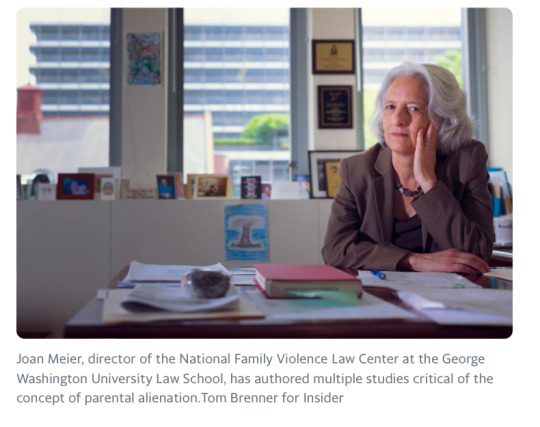
Richard Gardner began writing about children of divorce in the 1970s, when a dramatic transformation was underway in family court. Under the "tender years presumption," judges had long favored women in divorce cases, typically assigning children to their mother's sole custody. But as more women entered the workforce, more men participated in child-rearing, and more couples divorced, a nascent "fathers' rights" movement emerged, demanding gender neutrality in custody proceedings. The idea appealed to many feminists, too. By the 1980s, most states had recognized joint custody in their statutes.
This left judges in a quandary when couples failed to settle. Now, aside from a vague mandate to advance the "best interest" of children, courts lacked a clear paradigm for resolving disputes. Overwhelmed, judges turned to mental-health professionals, asking them to assess each parent's fitness and recommend an optimal arrangement. Gardner, then an associate clinical professor of child psychiatry at Columbia University, was an early custody evaluator, and in 1982 he published a how-to manual.
By 1985, Gardner was arguing that some mothers, seeking to regain their advantage in court, were inducing a mental illness in their children, a condition he dubbed parental alienation syndrome. Children afflicted with the syndrome, he said, could be identified by the "campaign of denigration" they waged against their fathers, which was accompanied by "weak, frivolous, or absurd" rationalizations and a disquieting "lack of ambivalence."
Some "fanatic" mothers even manipulated children into claiming their fathers had sexually abused them, Gardner contended. When other maneuvers against a father fail, he wrote, "the sex-abuse accusation emerges as a final attempt to remove him entirely from the children's lives." Child sexual-abuse claims made during custody disputes, he claimed, "have a high likelihood of being false." To prove children are suggestible, he often invoked the wave of 1980s cases in which preschool teachers were charged with sexual abuse but later exonerated.
Gardner's theory sidestepped what Joan Meier saw as a glaring truth: Many children accused their fathers of abuse because their fathers were actually abusive. In fact, by the early 2000s a large-scale study had found that contrary to Gardner's writings, neither children nor mothers were likely to fabricate claims during custody disputes.
The remedies Gardner proposed for parental alienation syndrome were harsh. "Insight, tenderness, sympathy, empathy have no place in the treatment of PAS," he said in a 1998 address. "Here you need a therapist who is hard-nosed, who is comfortable with authoritarian, dictatorial procedures."
In a 2001 documentary, Gardner told a journalist how a mother might respond to a child reporting sexual abuse: "I don't believe you. I'm going to beat you for saying it. Don't you ever talk that way again about your father."
Juvenile detention could cure children who refused to visit their fathers, Gardner said. But the main remedy he advanced in severe cases was "the removal of the children from the mother's home and placement in the home of the father, the allegedly-hated parent." This would break what he called a "sick psychological bond."
After introducing his theory, Gardner began using it in expert testimony and promoting it to other evaluators and fathers'-rights activists. By the early 2000s, family-court judges were regularly citing parental alienation.
To address this, Meier said, she undertook a series of academic articles examining the scholarship on parental alienation. She found that the theory was based on circular reasoning and anchored almost entirely in anecdotal data.
"I still believed in that day that if you did careful, thoughtful analytic scholarship, people would read it and be persuaded by it," she said.
The scarlet 'A'
Jill Montes had always wanted a big family. In 2008, she already had a 5-year-old daughter, Paige, with a man she'd divorced, and she was finding regular work as an actor in Los Angeles. She decided to adopt an infant son, Robert.
The next year, she met Thomas Winenger, who had master's degrees in engineering and business, on eHarmony. "He wanted to talk a lot about faith and God, and that wooed me," she said. She also welcomed his interest in Robert, whom she was insecure about raising alone.

In 2011, the couple married and settled near San Diego, and Montes quit acting. Soon, she later said in a court filing, Winenger was shoving, insulting, and threatening her, often in front of the kids. He promised to change, and she hoped he could. In 2012, their first child, Claire, was born, and Eden followed in 2015. Insider is identifying Montes' children by only their middle names.
Later that year, Montes accused Winenger of dragging Paige across a room. Montes sought a restraining order, which was ultimately denied, and kicked him out. He rented a room in a house nearby, where he regularly hosted the three younger kids. Sometimes, Robert went there by himself.
Montes filed for divorce in February 2018. Under an informal agreement, the kids continued spending time at Winenger's place. But at a hearing that fall, a 10-year-old Robert testified that during an argument over his math homework, Winenger had repeatedly grabbed, shoved, and spanked him.
Montes filed a petition for a domestic-violence restraining order, which Winenger fought, saying he hadn't mistreated Robert. In the end, Ratekin, the judge presiding over the divorce, signed a "stay away" order prohibiting Winenger from contact with Robert. But it didn't address the allegation of violence. Weeks later, Winenger asked Ratekin to name him Robert's legal father, arguing that he'd helped raise the boy from toddlerhood. Ratekin ruled in his favor and ordered the custody evaluation.
In court papers he filed on July 19, 2019, the day after the evaluator was appointed, Winenger accused Montes of parental alienation.
Often, according to Meier, the dynamic of a custody case shifts radically once alienation is raised. "It's like the table turns 180 degrees and now the only bad parent in the room is the alleged alienator," she said. An abuse allegation "fades out of view," she said, and any attempts by the mother to limit the father's access are seen as suspicious. It's almost as if, like Hester Prynne in "The Scarlet Letter," she's been branded with a flaming red "A," Meier said.
Indeed, Montes soon lost ground in court.
In January 2020, Ratekin ordered Robert into the care of a therapist, Mitra Sarkhosh, who has since provided aftercare for at least one reunification program. Sarkhosh saw Robert and his father together about 20 times, charging $200 an hour. But by summer, she had halted the sessions, saying Robert's anger was "not improving."
In a report filed in court, Sarkhosh appeared to blame Montes. Living with her, Robert was "saturated with negativity about his father," she wrote. There may be a need for "new interventions." (Citing patient-confidentiality laws, Sarkhosh declined an interview request.)
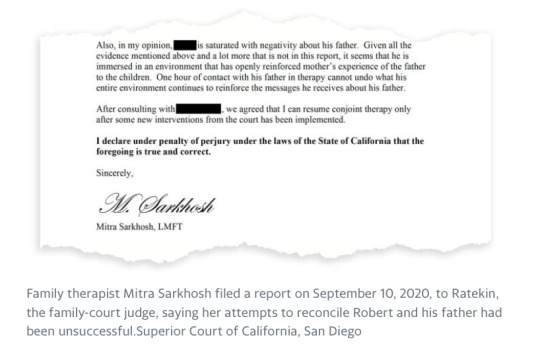
Robert was relieved to be finished with Sarkhosh, Montes said. He started seeing a new therapist, and, during the first session, he told the therapist he'd been sexually abused.
On November 18, 2020, at the direction of the San Diego County Sheriff's Department, Robert called Winenger to try to elicit a confession. When that failed, the department paused its investigation, but the child welfare inquiry proceeded. On December 1, the California Health and Welfare Agency issued a report substantiating Robert's claims.
"The Agency is worried that if given the opportunity, Tom Winenger will sexually abuse [Robert] again," the report says.
Neither Winenger nor his divorce attorney, Tamatha Clemens, responded to requests for interviews or to a list of detailed questions. In a motion for custody he filed on December 8, 2020, Winenger argued that Robert's allegations had been "orchestrated" by Montes and that her alienation "will not stop until she is restrained by the court."
The welfare agency sent Ratekin its report on January 4, 2021, according to a cover sheet reviewed by Insider. But Ratekin was still awaiting the custody evaluation, which she'd assigned to a psychologist, Miguel Alvarez. In 2009, Alvarez coauthored a handbook for parents in custody disputes. While the manual spells out in detail how to prove an alienation claim, it offers no specific guidance on how to prove a claim of abuse.
According to the report, part of which Insider reviewed at a San Diego County courthouse, a personality test Alvarez administered suggested that Montes suffered from "extreme hyper-vigilance" and "persecutory fears." People with these traits, Alvarez wrote, "are often quick to anger and overreact to perceived or imagined threats."
Winenger's scores on the same test were "normal," Alvarez wrote, and his performance on psychosexual and polygraph tests was "inconsistent" with Robert's allegations of sexual abuse.
The 136-page evaluation cost Robert's parents more than $90,000, according to bills reviewed by Insider. Alvarez didn't respond to requests for comment.
Ratekin reviewed the evaluation just before the October 28, 2021 hearing. Alvarez's findings were "exactly" what she'd expected, she said. In her view, the situation called for immediate action.
She put Claire, 8, and Eden, 6, in their father's custody that day, and she sent Robert, 13, to stay with his football coach. That was for Winenger's protection, she said. Until Robert was "detoxified," she said, he'd be prone to false claims of abuse.
Ratekin suggested Family Bridges as a solution. She'd had "really good success" with the program in another case, she said, and she thought it would ease Robert's transition. Without it, the boy wouldn't "get better," she said, and his sisters stood to benefit, too.
Winenger agreed. Under an order Ratekin signed on January 3, 2022, the children would attend a Family Bridges workshop with their father from January 11 to 14 and then return to his home. Montes was barred from contact with the children for at least 90 more days. Ratekin also prohibited the children from communicating with their older sister, their maternal grandmother, and anyone else who might "interfere" with their healing.
Contact would resume at Ratekin's discretion, depending upon how well everyone was cooperating.
Insider and Type reviewed 35 cases from the past two decades in which judges removed children from their preferred parent and sent them to a reunification program. In most of these cases, the children had resisted court-ordered visits with their fathers, and judges had held mothers responsible. Many of the judges framed the no-contact period as salutary: Children would be freed from the overbearing influence of their mothers, and their mothers would be motivated to change.
A case from New Castle County, Delaware is typical.
In 2016, Judge Janell Ostroski transferred two brothers to their father's custody and ordered them into treatment at Turning Points for Families, a program in upstate New York run by a social worker, Linda Gottlieb. Both boys had told Ostroski that their father, Michael D., yelled at them frequently, court records show, though neither had alleged physical abuse. The 9-year-old, O., told Ostroski he felt unsafe at his dad's house. Ashton, 14, was refusing to go there. Insider is not using the family's full last name in order to protect O.'s identity.

Michael had pleaded guilty several years earlier to public intoxication and indecent exposure for an incident in a public park with Ashton. A court-ordered psychological evaluation found that he had alcohol dependence and narcissistic personality disorder "with antisocial features." In 2013, the state's child welfare agency found that he'd emotionally abused Ashton, then 10 years old. The report, including any denials Michael presented, is sealed. This history was all cited in court three years later, in a custody dispute between Michael and his ex-wife, Kelly D.
During that dispute, Michael accused Kelly of alienation, and a custody evaluator backed him up. The evaluator, a psychologist, determined that Michael had become "a more positively functional person" and that Kelly, a preschool teacher, was the problematic parent. Kelly "distorts the reality of events" and "conveys to others an inaccurate and menacing perception of Mr. [D.]," the psychologist wrote in a May 2016 report. (Michael did not respond to detailed requests for comment. Neither did the psychologist.)
In written rulings that barred Kelly from contact with both children, Ostroski said the boys were "well cared for" in Kelly's home but blamed her for Ashton's refusal to see Michael. "Mother has done nothing in the past year to promote the Father/son relationship," Ostroski wrote, adding, "the court is hopeful that, with the appropriate interventions, Mother can recognize her role in helping the children have a healthy relationship with their Father."
Insider and Type sent questions about parental alienation and its remedies to Ostroski, Ratekin, and 19 other judges who've ordered the programs. Only Ratekin responded, and she declined to speak about the Winenger case because it is still pending. Nor would she answer general questions. "I am definitely not an expert in this area," she wrote, "nor do I feel qualified to answer questions about the issue or programs."
'A moratorium on the past'
In her January 2022 ruling, Ratekin authorized Winenger to hire a transport company to drive Robert and his sisters to the Family Bridges workshop, which would take place at a hotel a few hours outside San Diego. There, the children and Winenger met Randy Rand, who founded Family Bridges in the early 2000s, and a woman the children knew only as "Chris."
In 2009, Rand deactivated his psychology license after the California Board of Psychology found he'd committed professional violations including "dishonesty," "repeated negligent acts," and "gross negligence." Since then, he's accompanied at workshops by at least one other clinician. Rand isn't the only alienation expert to face sanctions from a state licensing board. Two other psychologists who've led Family Bridges workshops, Jane Shatz of California and Joann Murphey of Texas, have been sanctioned — Shatz after an allegation of negligence and Murphey after a finding that she failed to respond promptly to a subpoena. Both Alvarez, the custody evaluator in Robert's case, and Steinberg, who runs the program where a judge sent the girl in the viral TikTok, have been cited by California regulators for improper recordkeeping. Steinberg said her citation was the result of a series of meritless complaints by an "alienating parent."
Family Bridges workshops are held at hotels around the country and tend to cost parents more than $25,000, receipts show. In 2016, for example, one family from Seattle paid more than $27,000 to Family Bridges and another $3,500 to spend three nights at a Sheraton in Southern California. Since the children had opposed the intervention, a company was hired to transport them for an additional $8,300.
Once they arrive at Family Bridges, children quickly learn the rules, program documents show, including a policy called "a moratorium on the past." As Murphey, the Texas psychologist, testified in 2018, "There's no talking about 'You did this back when.'" Instead, she explained, "this is a new family, this is a new paradigm, we are starting off in a healthy way."

Ally Toyos was a 16-year-old in Kansas when she was taken from her mother five years ago. In an interview, she said she and her then 14-year-old sister tried defying the Family Bridges moratorium, telling Rand and his colleagues that their dad had abused them. (Toyos' mother said a court order prevented her from speaking with the press; Toyos' father didn't reply to interview requests.) Threats ensued, Toyos said. The girls were told that if they didn't comply, they could be separated, sent to wilderness camps, committed to psychiatric facilities, and cut off from their mom for the rest of their childhoods, according to Toyos.
Much of the Family Bridges workshop involves watching and discussing videos, program documents show. One of them, "Welcome Back, Pluto," tells the fictional story of a petulant teen who scorns her father. "If you're alienated, like Emily, you might get mad when others don't take your complaints seriously," a female narrator says. In time, however, Emily "learned to see things more clearly." She realized her complaints were "exaggerated," the narrator explains, and "sounded just like her mother's."
According to the video, which was scripted by Richard Warshak, a psychologist who helped develop Family Bridges, some children who steadfastly reject a parent "suffer for the rest of their lives."
Other materials warn children against trusting their memories. Toyos, whose workshop took place at the C'mon Inn in Bozeman, Montana, said she was shown a 2013 TED Talk by Elizabeth Loftus, a psychologist who developed the idea that memory is malleable and who has served as a defense witness in high-profile trials, including Harvey Weinstein's. Memories are often contaminated by outside influences, Loftus warns in the talk, which leads to false accusations that can ruin lives.
Insider and Type spoke with or reviewed statements by 17 youths ordered into Family Bridges, Turning Points, or other reunification programs. Their accounts of the workshops were broadly similar. Hannah Rodriguez, then a 16-year-old living in Tampa, Florida, said her workshop, in 2016, was held at Linda Gottlieb's home in New York's Hudson Valley. Gottlieb, the author of a book on parental alienation syndrome, had founded Turning Points about two years earlier. Rodriguez said Gottlieb's office was right off the living room, where her husband spent his time in a recliner. Every day, Rodriguez could see him and hear his TV shows, she said.
Rodriguez, Toyos, and several other former participants said the workshops plunged them into depression.
In spring 2022, one 13-year-old girl got so distressed during a session with Gottlieb at a hotel that she banged on a wall and screamed for help, court papers show. Someone called the police, who brought her to a hospital for a psychiatric evaluation. "I just want my mom," the girl said, according to hospital records, but under the court order she couldn't call her. She was held at the hospital for three days.
In a written statement that Montes said he later dictated to her, Robert said he became suicidal. "The only thing that stopped me from throwing myself off the balcony was the 24/7 surveillance," the statement reads. "I never thought so many people would be that horrible, controlling, and manipulative towards little kids."
At the end of the workshop, Robert went home with Winenger and had "horrible, weird depressive anxiety episodes," according to the statement. In early February, he was admitted to the psychiatric ward of a children's hospital, according to court records.
Repeated emails to Rand were met with an auto-response saying he was "on sabbatical." The psychologist managing Family Bridges in his absence, Yvonne Parnell, declined interview requests, as did Gottlieb. Gottlieb forwarded Insider's queries to a lawyer, Brian Ludmer, but Ludmer said he couldn't speak for her. Neither Parnell nor Gottlieb replied to detailed written questions.
Lynn Steinberg said her program One Family at a Time, based in Los Angeles, has treated some 50 families over the past eight years. A family therapist, she's the author of "You're Not Crazy: Overcoming Parent/Child Alienation." She was the only program director who agreed to talk.
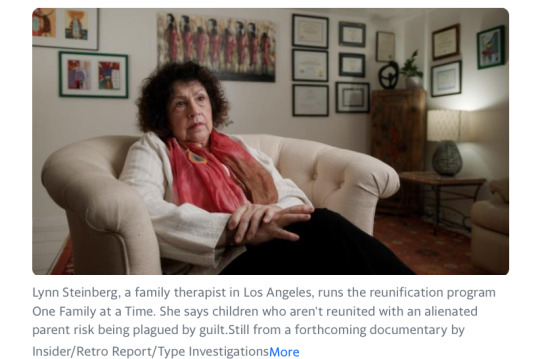
She said she begins each workshop by listening to the children and taking down every accusation they make; she then works to achieve "an agreement between parent and child." After those conversations, she said, the children are dramatically transformed. They apologize and cry, she said; they kiss and embrace the parent they'd rejected, even sitting in the parent's lap. They're eager to make up for lost time, she said, and can't wait to see long-lost kin.
Daniel Barrozo, of Chino, California, said Steinberg's workshop was a "tremendous help" to him and his daughter in 2021. Steinberg successfully challenged his daughter's misperceptions about him, he said. When Steinberg asked her what he'd done wrong and what she hated about him, his daughter simply looked down and cried, he said. "The whole time, she had nothing to say, because Mom was the one speaking for her," he said. Now, he said, his relationship with his daughter is stronger than ever.
Steinberg said her own mother alienated her from her father, a realization she reached only after his death. She called her ex-husband an alienator, too, saying her adult daughters reject her to this day. She regrets that they didn't get help from a program like hers.
Left untreated, alienated children "fail at relationships" and risk developing eating disorders, drug addiction, depression, gender dysphoria, and other ills, Steinberg said, citing her clinical experience.
But an increasing number of scholars are criticizing the programs. Jean Mercer, an emeritus professor of psychology at Stockton University, is the author of recent papers on parental alienation. One examined six reunification programs, including Family Bridges and Turning Points, and found that the research evidence supporting the effectiveness of the programs "has few strengths and many weaknesses." For another paper, Mercer reviewed the scholarship on the programs and statements from five youths who'd attended them. She found that the programs "may contain elements of psychological abuse."
Another study, by Michael Saini of the University of Toronto, examined 58 empirical papers on alienation and its treatments and found the body of research "methodologically weak." While some divorcing parents exhibited "alienating behaviors" and some children rejected a parent, the nexus between those phenomena hadn't been proved, Saini found. Moreover, he found the studies hadn't shown that interventions worked.
Following the workshop, the programs commonly assign children to a specially trained aftercare therapist. Meanwhile, the exiled parent undergoes reeducation.
Insider obtained audio of a call last year between Gottlieb and the mother of a 14-year-old girl and a 12-year-old boy in Turning Points. "I think what you did is criminal," says Gottlieb, who, like Steinberg, has publicly stated that her own mother alienated her from her father. There was "no reason" the children shouldn't have a relationship with their father, Gottlieb says in the recording, and "you have failed miserably to require it."
"That's alienation," she says. "That is what you are guilty of, and it's child abuse." For the children's sake, the woman must "make amends," Gottlieb says. Otherwise, "I will recommend extending the no-contact period until they're 18."
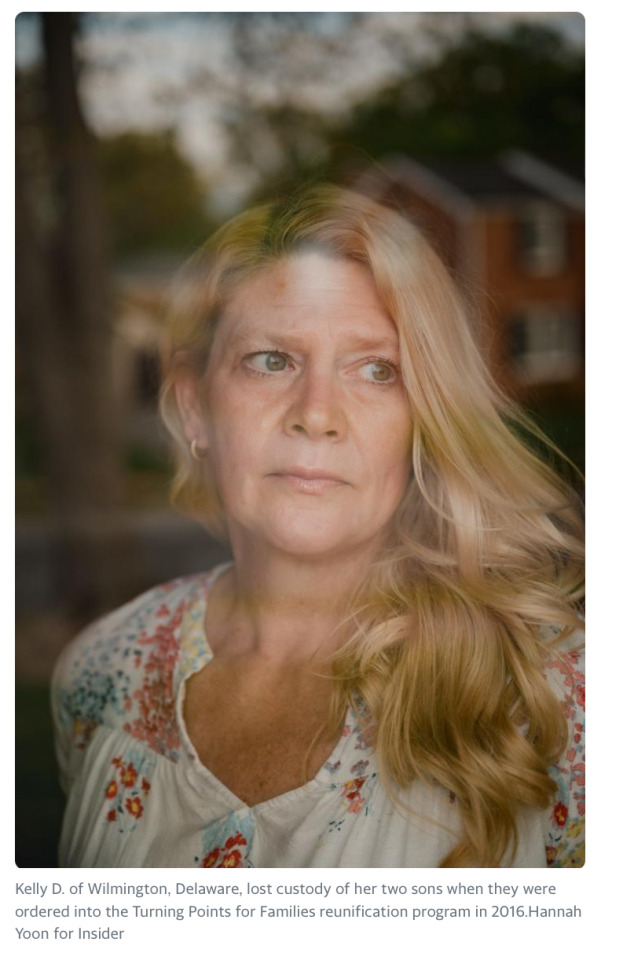
Insider and Type interviewed 12 mothers whose children were sent to Turning Points, many of whom said Gottlieb rebuked them over the phone and in emails. Most said they were required to write letters to the kids praising their fathers and submit them to Gottlieb for approval.
In early November 2016, Gottlieb told Kelly D. — Ashton and O.'s mother — that her letters contained superfluous details and secret messages and needed to be redone. In the end, Kelly submitted several drafts for each of her sons, all of which Gottlieb rejected.
"She sets a bar," Kelly said. "You try to reach the bar. She sets the bar higher."
Judge Ostroski had ordered Kelly to find a therapist "acceptable to Ms. Gottlieb" who would help her support Michael's relationship with the children. From a list provided by the Delaware Family Court, Kelly chose a psychologist, William Northey. But Gottlieb warned in an email, "I cannot approve him before I speak with him about his specialized knowledge of alienation."
The conversation went poorly. Gottlieb considered Northey unacceptable, she later testified, and Northey found fault with Gottlieb, too. He sent her a letter, reviewed by Insider, criticizing her for calling Kelly a "sociopath" and for using the phrase "parental alienation syndrome," which, he wrote, "is not a recognized diagnostic term."
Meanwhile, Gottlieb was making demands of Ashton and O. Shortly after they returned from New York, according to an email to both parents obtained by Insider, Gottlieb determined that they needed to transfer schools immediately, as their current schools had "actively undermined" their relationship with their dad.
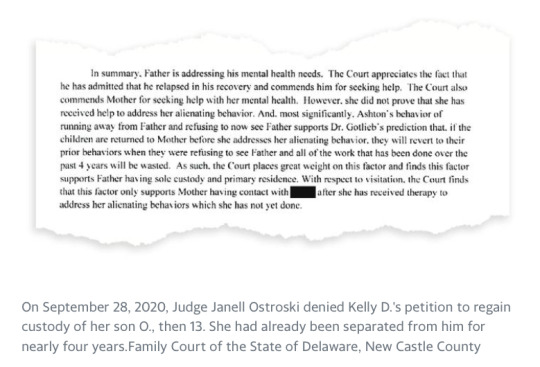
She sought custody of O., too. But in September 2020, Ostroski found that Kelly still hadn't been properly treated for her alienating tendencies and denied her petition.
For now, even visits were too risky, Ostroski concluded.
"Ashton's behavior of running away from Father and refusing to now see Father supports Gottlieb's prediction that, if the children are returned to Mother before she addresses her alienating behavior, they will revert to their prior behaviors when they were refusing to see Father and all of the work that has been done over the past 4 years will be wasted," Ostroski wrote in the ruling.
'Junk science'
In June 2010, more than a thousand mental-health practitioners, lawyers, and judges gathered at the Sheraton in downtown Denver for the annual conference of the Association of Family and Conciliation Courts, which unites players in the child-custody field from around the world. The theme that year was "Traversing the Trail of Alienation," and over four days the condition was discussed in more than 30 sessions. Participants could learn how to spot an alienating parent, when it was best to defy a child's wishes, and what might help an alienated child heal.
The event signified a remarkable embrace of an idea whose author had been consumed by scandal and tragedy just a short time earlier.
In the late 1990s, critics of Gardner's dealt a powerful blow to his credibility by unearthing writings in which he'd defended pedophilia.
"Sexual activities between an adult and a child are an ancient tradition," he wrote in a 1992 book.
As a product of Western culture, he viewed pedophilia as reprehensible, he wrote, but it may not be "psychologically detrimental" in other cultures. The following year, in a journal article, Gardner argued that from an evolutionary standpoint, children benefited from being "drawn into sexual encounters," since these experiences steered them toward early reproduction. "The Draconian punishments meted out to pedophilics go far beyond what I consider to be the gravity of the crime," he wrote in 1991 in "Sex Abuse Hysteria: Salem Witch Trials Revisited."
In May 2003, at age 72, Gardner dosed himself with painkillers and stabbed himself to death. His son told reporters he was driven to suicide by chronic pain that had recently worsened.
In the assessments of his life that followed, Gardner's work was lambasted by prominent psychiatrists, including Dr. Paul Fink, a past president of the American Psychiatric Association. "This is junk science," Fink told Newsday in July 2003. "He invented a concept and talked about it as if it were proven science. It's not."
The theory could have died with Gardner. Instead, it gained ground.
In 2001, Richard Warshak, a clinical professor of psychology at the University of Texas Southwestern Medical Center, published "Divorce Poison: Protecting the Parent/Child Bond From a Vindictive Ex." The book, released by HarperCollins, brought parental alienation theory to a wider audience — and made it more palatable. Unlike Gardner, Warshak spoke of alienation in gender-neutral terms, saying many fathers were programmers, too, and he likened the no-contact period between children and their preferred parent to study abroad.
Warshak started leading workshops for Family Bridges around 2005 and eventually became its unofficial spokesman, a role in which he excelled. In 2010, he appeared in "Welcome Back, Pluto" and published an influential article about Family Bridges in the AFCC journal.
In that study, Warshak reported on outcomes for the 23 children he'd worked with in the program so far. During the four-day workshop, 22 of them recovered a "positive relationship" with their rejected parent, he observed, including recalcitrant teens.
After the workshop, however, four children regressed, Warshak wrote, following what he called "premature" contact with their preferred parent. The program worked best, he said, when this contact was blocked "for an extended period of time." Warshak didn't respond to interview requests.
Meanwhile, another Gardner successor, Dr. William Bernet, a professor of psychiatry at Vanderbilt University, was working to push alienation theory forward. He submitted a proposal to the American Psychiatric Association to include "parental alienation disorder" in the next version of its Diagnostic and Statistical Manual of Mental Disorders, or DSM, and authored a scholarly article making the case for inclusion. He submitted a similar application to the World Health Organization, which was revising its International Classification of Diseases.
Bernet declined a request for an interview. But in a 2010 book, he wrote that since alienation scholarship had advanced in the wake of Gardner's death, "there is no need now to dwell on the details of what Richard Gardner did or said or wrote."
At the AFCC's conference in Denver in June 2010, Warshak was given a platform to discuss his Family Bridges paper, as was Bernet, to describe his DSM bid. Other presenters staked out a more moderate stance, arguing that while alienation was a pervasive problem, there was insufficient research to support construing it as a mental illness or ordering extreme interventions.
A few alienation opponents presented, including Joan Meier. But she said she flew home to Washington in tears.
"Everywhere I turned, alienation was the coin of the realm," she said.

She set out to design a study that would document how women who alleged abuse were treated in family courts nationwide — especially when alienation was raised. The Justice Department supported the project with a grant of $500,000.
In 2013, the new edition of the DSM was released with no mention of parental alienation. And in 2020, the World Health Organization ruled that parental alienation was "not a health care term" and lacked "evidence-based" treatments.
Bernet and his colleagues simply regrouped. In court, they started calling alienation a "dynamic" or a "phenomenon" rather than an illness, which appeared to satisfy some judges. And Bernet incorporated the nonprofit Parental Alienation Study Group, a coalition of parents, lawyers, and therapists who collaborated on cases and research. Rand, Gottlieb, and Steinberg joined, along with hundreds of other mental-health practitioners involved in custody work. Many, like Steinberg and Gottlieb, claimed to have experienced alienation themselves.
Meier assembled her own research team, comprising a statistician, three social scientists, and two assistants, to conduct her large-scale study. In January 2020, just weeks before the WHO decision, the results were published in the Journal of Social Welfare and Family Law.
The stark findings shocked even her.
Most trial-court rulings in custody cases are unpublished, but Meier's team identified 15,000 rulings involving abuse or alienation that were published electronically from 2005 to 2014. After winnowing that dataset to cases in which the only parties were two warring parents — not, for example, a child welfare agency — the team was left with 4,300 rulings. There were nearly 2,200 cases in which a mother had accused her ex of spousal or child abuse, and in 10% of these, the father had fought back with an alienation claim.
In general, judges were hesitant to credit mothers' abuse claims. When alienation wasn't raised, judges credited these claims 41% of the time, Meier found, and 26% of the time, mothers lost primary custody.
For the 222 mothers whose spouses accused them of alienation, the picture was even grimmer. Women who alleged abuse and whose husbands accused them of alienation lost custody half the time — twice as often as women who weren't accused of alienation.
To Meier, one of the study's most staggering findings was how rarely mothers branded with the scarlet "A" were believed. In cases where mothers alleged child physical abuse and fathers cross-claimed alienation, judges credited mothers a mere 18% of the time, she found. And in the 51 cases where mothers alleged child sexual abuse and fathers claimed alienation, all but one mother was disbelieved.
For a father accused of child molestation, Meier concluded, "alienation is a complete trump card."
'The whole world is watching'
In January 2022, three months after losing her children, Montes chanced upon a sickening discovery.
In a cloud storage account she'd once shared with Winenger, she said, she found thousands of his photos and videos, including explicit images of their three shared children. She loaded them onto a thumb drive for the San Diego County Sheriff's Department, whose investigation into Winenger had never closed.
Within days, Winenger was arrested. He was soon charged with 19 felonies, including possession of child pornography and 14 counts of committing forcible lewd acts against a child, Robert.
He pleaded not guilty and was released on bail, his access to the children suspended. Because of the no-contact order he'd previously obtained against Montes, the children landed in a county shelter. Winenger's defense attorney, Patrick Clancy, declined to comment on Winenger's behalf, saying he doesn't try his cases in the press.
Suddenly, the custody dispute was transferred to juvenile dependency court, which meant Ratekin was no longer presiding. The new judge ordered the kids into their mother's care while the case was pending. On February 18, they came home.
At first, Montes said, the two youngest children were so scared of being taken again that they couldn't sleep in their rooms. She set up a big mattress on her bedroom floor.
Meanwhile, Joan Meier was using her research to make inroads with policymakers.
She'd worked with colleagues to draft a federal law that would incentivize states to protect children from abusers during custody disputes. They named the bill Kayden's Law, after a girl in Pennsylvania whose father murdered her during a court-ordered visit. During negotiations over reauthorization of the Violence Against Women Act, the child's congressional representative, Brian Fitzpatrick, got Kayden's Law in.
The legislation, signed into law on March 15, 2022, sets aside up to $5 million a year for grants to states if, among other measures, they mandate training for custody judges on abuse and trauma and prohibit them from ordering treatments that cut children off from a parent to whom they are attached. If enough states comply, the law could spell the end of the reunification programs.
Last summer, California was the first state to consider such a bill. It was introduced by state Sen. Susan Rubio of Los Angeles County, a survivor of domestic violence herself, after she heard from mothers who'd been accused of alienation and children who'd been sent to reunification programs.
Rubio's bill set off a battle that has since spread to statehouses around the country. Steinberg, the alienation therapist from Los Angeles, was a vocal opponent, arguing that men would be rendered powerless against false accusations. She was joined by fathers' rights groups and by the Parental Alienation Study Group, which was simultaneously pushing hard to discredit Meier's study. (Two prominent members of the group authored a studyconcluding that her findings could not be replicated, which Meier then rebutted.) After Rubio's bill passed the assembly unanimously last August, she was forced to withdraw it in the face of intense opposition from state judges over the training mandate.
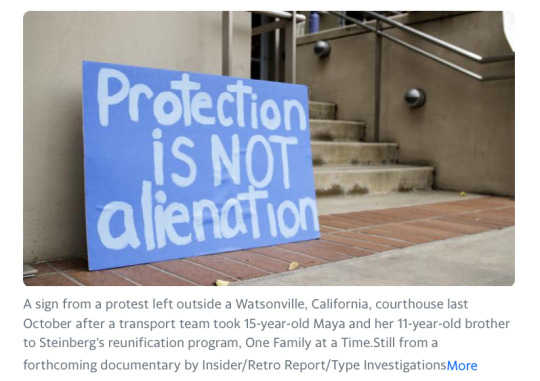
Then, last October, the momentum shifted. That's when Maya, the 15-year-old from Santa Cruz, told a custody judge that her mother had abused her and her brother. The judge, Rebecca Connolly, didn't believe her and ordered the children into Steinberg's program, cutting off contact with their father. The graphic video of the children being seized on October 20 was quickly viewed millions of times.
In response to an interview request, an officer of the Santa Cruz County Superior Court said Connolly could not speak about pending cases. Maya's mother has denied the abuse claims in court. Her lawyer, Heidi Simonson, declined an interview, citing court orders pertaining to "privacy and confidentiality."
On the heels of the viral video, a coalition of activists — many of them mothers accused of alienation — organized protests around the country. The first took place October 28 outside the courthouse where Maya had just testified. Standing on concrete risers and facing the building, a pack of Maya's friends demanded her return. "The whole world is watching!" they shouted. Protests also erupted in Michigan, Kansas, and Utah.
Rubio introduced a new bill, with modified judicial training requirements, in February. A similar bill passed both chambers of the Colorado legislature in April. One in Montana died in committee; its sponsor, Sen. Theresa Manzella, said she was up against a "deliberate distribution of misinformation" by opponents, including attorneys who use parental alienation as a legal tactic.
Montes said she's "cautiously optimistic" about Winenger's criminal trial, set to begin in June, and she hopes for an imminent victory in her custody case. Five years of legal bills have left her in debt and on food stamps, she said, but she considers herself lucky all the same. Almost every day, she talks to mothers who remain severed from their children.
Mothers like Kelly D., whose children were sent to Linda Gottlieb's reunification program in New York.
Kelly last saw her younger son, O., early on a Monday morning. It was a warm, sunny day, and she dropped him off at his best friend's house so they could shoot baskets before school. She hugged him, told him she loved him, and said she'd pick him up in the afternoon. Then she drove to court for a hearing.
That was six years, six months, and 24 days ago.
The reporting for this story is part of a forthcoming documentary from Insider, Retro Report, and Type Investigations.
If you are experiencing domestic abuse, you can call the National Domestic Violence hotline at 1-800-799-7233.
Read the original article on Insider
#USA#family courts#Child custody#abusers making themselves the victims#Parental alienation#Children being abused after the courts removed them from their mothers#Family Bridges#Dr. Richard Gardner#Reeducating children#Threat therapy#Long article#State sponsored gaslighting of children#Lynn Steinberg#One Family At A Time#Pathologizing abuse victims
846 notes
·
View notes
Text
Dandelion News - October 1-7
Like these weekly compilations? Tip me at $kaybarr1735 or check out my Dandelion Doodles on Patreon!
1. Arctic ozone reaches record high in positive step for climate

“Above-average ozone levels continued to persist through September 2024. This is significant as, previously, spring has been associated with ozone depletion[….] The March 2024 ozone average peaked at 477 Dobson units (DU), which is 6 DU higher than the previous record in March 1979 and 60 DU higher than the average for the study period (1979 to 2023).”
2. Why Massachusetts loves Nibi the beaver and [won the fight] to keep her out of the wild

“Nibi, now 2 years old, is roughly the age when wild beavers embark on their journey to find a mate and build a home. [… But] if Nibi is released in October, she would be ill-prepared for the winter[…. The governor has] issued a permit for Nibi to remain at a wildlife rescue as an educational beaver and inspire folks to protect our natural world."”
3. In Madagascar, Taniala Regenerative Camp aims to heal deforestation scars

“Residents of the villages around Lambokely manage the nursery and market garden crops. “Local communities receive training in agroecology and agroforestry, benefit from improved soil fertility, and earn additional income from intercropping in the agroforestry plots. In addition, community members are incentivized to participate in tree-planting activities.””
4. Tunica-Biloxi Tribe of Louisiana Breaks Ground on $6.4 Million Affordable Housing Project

“The project’s first phase will create three-bedroom homes designed for multiple purposes, including elderly housing, emergency shelter, and support for displaced and low-income Tribal citizens. These homes will be built to meet Americans with Disabilities Act (ADA) standards, ensuring accessibility for all.”
5. Scientists say painting roofs this colour could save lives: How does it keep cities cool?

“[Researchers] found that cool, light-coloured roofs installed across all of London’s roofs could have cooled the city by around 0.8C [in 2018]. [… Solar panels] could have cooled the city by around 0.3C, preventing the deaths of 96 people [… while generating] more than half the energy [used by] London during the entire year of 2018.”
6. Travis County [TX] opens center to help keep people experiencing a mental health crisis out of jail

“The walk-in urgent care facility is open 24/7 and provides immediate support for people experiencing mental health crises. From there, some patients may be referred to a residential facility[… where] patients will be able to stay for up to 90 days[….] Jailed individuals may also work with their legal teams to coordinate admission to the facility.”
7. Spain’s first transgender soccer team makes debut in regional men’s league

“A soccer team consisting entirely of transgender men has[…] become the first all-trans squad to achieve federated status in Europe. […] Spain passed a pioneering trans rights bill last year designed to make it easier to change a person’s legal gender identity. […] Players may also choose to use a name that’s different from their legal one[….]”
8. Green Status of Species: Pushing Conservation Ambitions Beyond Preventing Extinction

“[… T]he Green Status of Species [is] a new part of Red List assessments that helps tell “a species’ full conservation story.” […] In addition to quantifying species recovery, the Green Status of Species […] will help to better inform future conservation actions by shedding light on which past actions have contributed most to species recovery.”
9. Hell froze over in Texas – the state will connect to the US grid for the first time via a fed grant

“[The projects will] boost grid reliability, lower energy costs, and support the clean energy transition. […] They’ll also generate nearly 9,000 jobs, supporting local economies[…. In particular, the Texas portion is] designed to prevent outages like the ones during Winter Storm Uri that hit Texas hard in 2021.”
10. Pine martens released to be reintroduced to Devon

“Work to release 15 pine martens into woods across Dartmoor has been completed[….] The eight females and seven males have all been fitted with a radio collars to allow their movements to be tracked. […] They were kept in soft-release pens for three days to get them used to their surroundings before being allowed to run wild, staff said.”
September 22-28 news here | (all credit for images and written material can be found at the source linked; I don’t claim credit for anything but curating.)
#hopepunk#good news#nature#ozone#ozone layer#climate change#beaver#madagascar#forest#louisiana#native#affordable housing#housing#low income#global warming#solar panels#mental health#incarceration#texas#spain#transgender#trans men#soccer#football#conservation#endangered species#electricity#clean energy#pine marten#animals
75 notes
·
View notes
Text
the internet is rotting, as Jonathan Zittrain noted in an important (but paywalled) 2021 Atlantic article. A huge percentage of the links on the internet are broken, and there is no single authoritative, accessible universal repository that keeps track of everything. It is frighteningly easy for crucial information to slip away. ...
The practice of making changes to an article without noting that you’ve made them is called “stealth editing,” and even the New York Times does it. ... The existence of stealth editing means that it’s difficult to trust that the version of an article you click on at any given moment is the article as it was originally published. ...
I also, to my alarm, realized just how dependent we are on private publications themselves to give us access to records of their own work. Often, they keep it payawalled behind locked gates and charge you admission if you want to have a look. There are lots of sources in the Chomsky book to which you have to subscribe if you want to verify, such as this 1999 story in the Los Angeles Times about NATO’s bombing of a bus in Yugoslavia. This is a story of national importance, far too overlooked at the time, but if you don’t subscribe to the LA Times, you need research library access or a workaround if you want to read it.
Thank God for the Internet Archive, whose Wayback Machine preserves as much of the internet as they can and is invaluable for researchers trying to figure out what was once housed at now-dead links. But the Internet Archive has its limits. Social media posts, YouTube videos, paywalled Substack posts, PDFs—all can be very difficult to track down after they disappear. If a politician tweets something embarrassing, for instance, and then deletes it, it might be preserved in a screenshot. But we know screenshots are easy to fake. So where do you turn to prove satisfactorily that something was in fact said? ...
it’s very easy to lose pieces of information that seem permanent. E-books, for instance, can be changed by their publisher without the changes even being noted. You might read a book on your Amazon Kindle one day and open it up the next day to look for a quote only to find that the quote has disappeared without a trace. The Guardian, for twenty years, hosted a copy of Osama bin Laden’s “letter to the American people,” an important historical document. After the letter went viral on TikTok, the Guardian removed it from the site entirely. The New Republic did the same after an article of theirs about Pete Buttigieg caused controversy. The documents in question can still be found, but only by digging through the Internet Archive. If that ever goes down, researchers will find that trying to piece together the online past is like trying to learn about a lost civilization from excavated fragments. ...
I think that in an age where people (rightly) don’t trust the information they’re getting to be true, it needs to be as easy as possible to do research. Instead, while we have better technology than ever for sifting through information, it’s still the case that the truth is paywalled and the lies are free. If you want to “do your own research” to check on the veracity of claims, you will run headlong into a maze of broken links, paywalls, and pop-ups. How can anyone hope to find the truth when it’s so elusive, trapped behind so many toll gates?
63 notes
·
View notes
Text
Social Media Update: Rock Sound TV Album Review
In 2021, Sleep Token posted a link to Rock Sound TV's review of their recently released album, This Place Will Become Your Tomb.
[Web Archive Link] [FB]
An offering, from the Rock Sound publication.

SLEEP TOKEN'S ‘THIS PLACE WILL BECOME YOUR TOMB' INTENSELY DEMONSTRATES WHAT IT MEANS TO BE HUMAN
By JACK ROGERS
With their second record, Sleep Token have created a piece of art that transcends this existence whilst also staying firmly rooted in what it means to feel so strongly. This is why it is so vital.
For as long as history will allow us to look back, music has been a means of exercising and exorcizing emotion. A vessel for the most beautiful, brutal and boundless feelings that our minds and bodies can conjure, it's a means of connection that transcends language, creed and culture. A universal escape from the trials and tribulations of the world that will outlast and outlive its creator by the millennia.
Music is humanity at its most vulnerable and visceral, and that is why it is so vital.
It's within this space that Sleep Token has always existed. Since their introduction to the world back in 2016, beginning as a means to present their love and appreciation for the ancient deity Sleep but becoming something much more significant in the process, they have built up a rabid and relentless following via their musical output and nothing more. By hiding away their identity and giving away no additional information, the focus is solely on sound and that sound has always attempted to breach the very essence of what makes us who we are. Tales of devotion and devastation, hope and heartache, are presented by Vessel and his associates in ways that enrich the soul and ensnare the senses, with only our own experiences there to compare the adoration and anguish with.
And it is with 'This Place Will Become Your Tomb', their brand new offering, that unique delivery comes to a head, and where Sleep Token show just how special they really are.
Following on from the ambitious variety of 2019's 'Sundowning', there is a new sense of otherworldly cohesion to this new album. A dense atmosphere, clinging to you like tar but with the texture of newly woven silk, the record feels like a deep glimpse into the magical universe that Sleep Token exists in. A place where time and space collide like lovers kept separate for too long and reality and fantasy blend like petrol seeping into water. A place where Vessel, as this sentient being, delivering these songs feels powerful and mysterious, someone to be feared as much as they are revered. From the towering dominance of 'Alkaline' to the haunting seduction of 'Like That', you are transfixed and taken to the other side by the intoxicating sounds filtering through you.
But on the other side of that comes the humanity of it all. With every heartbeat comes the threat of heartbreak, and to live passionately comes with the risk of feeling the worst that life has to offer as much as the best. Every moment that feels like it exists in a completely different dimension on 'This Place Will Become Your Tomb', another is firmly rooted on Earth, where desolation is always just around the corner from delight. You have the blossoming 'Mine' standing toe to toe with the tear-stained 'Distraction. The deep need of 'The Love You Want' is only a short distance away from the bellowed despair of 'High Water'. The spiralling longing of 'Hypnosis' and tender infatuation of 'Telomores' stare directly at the stark admissions of 'Fall For Me' and broken spirit of 'Missing Limbs'. The highs and lows of leaving ourselves open to others and committing our everything to them are presented in the most touching and terrifying ways, and it takes something rather remarkable to bottle that part of existence. But Sleep Token make it feel like second nature.
'This Place Will Become Your Tomb' is the sort of album that cannot be simply plucked out of the ether. It is a record from deep inside the soul, where layer upon layer has been chipped away to reveal the very essence of existence. Where life has been lived so viscerally, to the point where feelings you didn't even know were possible, have been felt, that every single movement made feels like either heaven or hell. It exists on a plane of its own crafting as much as it does here on in our own reality, and that is what makes it so extraordinary. It is a perfect summation of what it means to be human, whilst also trying to explain what it feels like when the things we experience make us feel like we have transcended this flesh altogether. The most intense love, intoxicating lust, and crushing loss are documented here in the most striking, seductive and sensational ways possible. And it is an absolute pleasure to behold it all.
Worship.
#sleep token archive#sleep token#on this day#album release#social media updates#tpwbyt#this place will become your tomb#tpwbyt album cycle#rocksound#album review#rock sound tv#.
22 notes
·
View notes
Text

Ghost. - part 2: What I knew. Part 1 here - part 3 here PAIRING: TVA!LokixOC WARNINGS: none SUMMARY: Loki meets sombody at the TVA he once knew. Unfortunately she doesn't seem to remember him. NOTE: that was supposted to be a one-shot, but I felt like writing a second part.
Time at the TVA flows differently. It's the first thing you learn arriving there. For instance, the alternation between day and night wasn't clear because there was no sun.
Loki didn't know how much time had passed since their conversation. Nor did he know how much time had passed since he sat in front of her at the desk, under the pretense of wanting company while analyzing documents. Nor did he know how much time had passed since he had stopped working to stare at her.
"If you want to ask me something, just do it. You're unsettling."
Apparently, too much time.
The truth was he had no questions.
"I was just wondering what you were working on" Loki said.
Lydia glanced up at him before returning her gaze to the documents. "The same thing as you, more or less. Dangerous variant on the run." After all, they were in the same department, so they obviously worked on the same things.
"And do you like it?"
Midgard, 2012.
"I see you wavering more and more every day" she said with a mocking smile.
"My goals have never been so clear" Loki spat.
"Oh, if you say so, great and mighty god," Lydia taunted, taking a candy from the bag she held. Loki stared, wondering what it was and where she got it.
Lydia followed his gaze, offering him a candy. "Want one?"
Loki took it and sniffed it under her amused gaze before putting it in his mouth and immediately spitting it out, making her laugh.
"But it's disgusting, I've never eaten anything so sweet and sticky."
"I bet you wouldn't want to destroy the Earth anymore if you could enjoy the pleasures it has to offer," Lydia said with a laugh, putting another candy in her mouth. "Why do you want to destroy it anyway?"
"I don't intend to destroy it, I intend to rule it," Loki narrowed his eyes.
"And what will you do with a realm you don't even like?"
Loki straightened up, looking away, but didn't respond.
Something clicked in Lydia's mind. "Ohh," she turned to him, a little too close for the god's taste, "it's your plan B."
Loki ignored her, walking toward the room where they conducted experiments on the Tesseract, but she caught up.
"It was Asgard, the one you wanted to rule. A realm of gods, full of wealth and abundance. But without candies and where everyone hates you," Lydia acidly smiled, and Loki quickened his pace. "It seems fair, everyone should have a plan B." Lydia grabbed another candy.
Loki turned to her. "And what's yours, Miss Princhett?" he said challengingly.
Lydia looked ahead, toward the end of the hallway. "This. SHIELD is plan B."
Loki turned to her, confused by the admission. "And plan A?"
"Doctor, maybe. My mother would have liked that for sure. Or a history teacher, like my other mom."
Loki stared at her for a moment, and she returned the gaze. They were polar opposites. He fiercely desired something and would do anything to get it. She, on the other hand, settled. This difference became clear to both of them in that moment. Probably, they both believed they were right and simultaneously envied each other's capacity.
"Your mouth is covered in sugar," Loki said before walking away.
TVA, 2021.
"And do you like it?"
"What a strange question," Lydia tilted her head, wrinkling her nose. "It's my job. I do what I have to."
"But isn't there anything else you'd like to do?"
Lydia opened her mouth a couple of times, then looked down before speaking. "I would have liked to be a teacher, maybe a history teacher. I've always loved the subject" she replied sadly.
"Well, I suppose this gets you close," Loki gave her an encouraging smile.
"I suppose so," she looked up at him. "And you, Loki Prince of Asgard? What do you wanna be?"
"King, of course," he spread his arms theatrically.
"Of course," she repeated with an amused air, rolling her eyes. "And what will be your first royal decree?"
"Hiring a very well-informed history teacher at court," Loki approached her, leaning on the desk as if about to confess a secret, and Lydia mimicked him, finding herself face to face with his deep blue eyes. "And I already have someone in mind," he winked.
Lydia blushed, grabbed a folder, and rolled it up before using it to hit Loki on the head.
"Ouch," he complained, rubbing his head. "That hurt."
"Oh, don't be a baby," she straightened up in her chair. "Let's get back to work before our analysts come to scold us."
Loki smiled before returning his gaze to the papers.
----
Hope you enjoyed! Feel free to leave a heart, a note or to reblog, this really helps a lot. Part 3 in a couple of days.
#loki x reader#loki x oc#loki series#loki laufeyson#loki season 2#loki#fanfic#loki x reader images#loki x you#loki x y/n#tva!loki#tva!lokixreader#tva!lokixoc
64 notes
·
View notes
Text
Also preserved in our archive
If you needed any more reasons to mask... I can confirm that RSV is no walk in the park.
by Katherine Kahn
In the years before the introduction of respiratory syncytial virus (RSV) vaccines, the virus was linked with substantial hospitalizations, intensive care unit (ICU) admissions, and in-hospital deaths among adults, according to a cross-sectional analysis of CDC data.
Adjusted analysis showed estimated RSV-associated hospitalization rates ranging from 48.9 per 100,000 adults during the 2016-2017 respiratory season to 76.2 per 100,000 in 2017-2018, reported researchers led by Fiona Havers, MD, MHS, of CDC's National Center for Immunizations and Respiratory Diseases in Atlanta.
Estimated hospitalization rates were highest among adults ages 75 and older, ranging from 244.7 per 100,000 in 2022-2023 to 411.4 per 100,000 in 2017-2018, findings in JAMA Network Openopens in a new tab or window indicated.
In addition, annual estimates of RSV-associated ICU admissions ranged from 24,400 to 34,900 for the 2016-2017 and 2017-2018 seasons, respectively, while estimated annual in-hospital deaths ranged from 4,680 in 2018-2019 to 8,620 in 2017-2018.
"These findings validated RSV as a substantial contributor to respiratory illness and hospitalization among adults, especially older adults," Havers and colleagues wrote, noting that up to 136,000 estimated annual hospitalizations occurred among those 65 years or older.
Researchers used data from the CDC's RSV Hospitalization Surveillance Network (RSV-NET)opens in a new tab or window to arrive at their estimates. From the database, they identified a total of 16,575 laboratory-confirmed RSV-associated hospitalizations from the 2016-2017 to the 2022-2023 respiratory virus seasons. To estimate RSV burden, Havers and colleagues used adjustment multipliers to correct for the relatively low proportion of adults who were actually tested for RSV while hospitalized, as well as test sensitivity.
Of note, RSV severity "appeared to be comparable to or possibly more than the severity of influenza and SARS-CoV-2" in hospitalized adults. In the study, about 19% of adults hospitalized with RSV required ICU care and 4.3% died in the hospital. In comparison, CDC data from the 2021-2022 season found that 15.5% of hospitalized adults with COVID-19 required ICU admission and 4.6% died, and 13.3% of patients hospitalized for the flu were admitted to the ICU and 4.6% died, they explained.
Also, estimates of RSV-associated hospitalizations in older adults were comparable to the burden of influenza-associated hospitalizations during milder influenza seasons.
Hospital deaths associated with RSV were highest among those ages 75 or older, at 5.8%. From the 2016-2017 respiratory season through the 2022-2023 seasons, adults 75 and older accounted for 45.6% of the hospitalizations, 38.6% of the ICU admissions, and 58.7% of the in-hospital deaths associated with RSV.
Deaths due to RSV were probably underestimated because the analysis did not include deaths after hospital discharge, Havers and colleagues noted.
The first-ever RSV vaccineopens in a new tab or window (Arexvy) received FDA approval in May 2023, followed by approval of a second vaccineopens in a new tab or window (Abrysvo) in June 2023. An mRNA RSV vaccineopens in a new tab or window (mResvia) was approved earlier this year as well. CDC recommendationsopens in a new tab or window now say that all adults ages 75 and older should receive a single dose of an RSV vaccine, as should those ages 60 to 74 years who are at increased risk of severe RSV disease.
"Given the large numbers of potentially vaccine-preventable hospitalizations and deaths associated with RSV, increasing vaccine coverage among adults at highest risk could reduce associated hospitalizations and severe clinical outcomes," the authors wrote.
Atypical patterns of RSV circulation occurred during the COVID pandemic. Lower hospitalization rates were observed during 2020-2021 and 2021-2022, whereas increased circulation and an earlier peak occurred during 2022-2023.
On average, only 43.5% of the hospitalized adults with acute respiratory illness whose data was included in the RSV-NET catchment were tested for RSV. During 2016-2017, RSV testing was performed in 30.4% of adults ages 18-49 years with acute respiratory illness, 33.1% in those ages 50-64 years, 31.5% for those ages 65-74 years, and just 27.7% of those ages 75 and older. During the 2022-2023 season, these proportions increased to 56.1%, 61.2%, and 61.6% for those age groups, respectively.
Clinicians frequently don't test for RSV in hospitalized adults with respiratory illness because of limited awareness of RSV as an important pathogen and because results do not generally change disease management, the study authors noted. Importantly, standard tests for RSV are now recognized to have lower sensitivity than previously thought.
The analysis had several limitations, including that RSV-NET data may not be generalizable to the entire country. Also, assumptions used in the adjustment analysis may have overestimated or underestimated the burden of RSV disease.
Study link: jamanetwork.com/journals/jamanetworkopen/fullarticle/2826104
15 notes
·
View notes
Text
dating bucky barnes would include...
pairing: fatws!bucky barnes x fem!reader
word count: 0.2k+
synopsis: little thoughts of what dating james barnes would be like
an: i wrote this in 2021 when i was still in high school and it is currently about to be 2024 in six weeks so i have no idea why i'm posting this but here i am
you’re his anchor
he turns into a soft, cuddly teddy bear when you’re around
at first he’s worried you wouldn’t love him because of his past, but he realized just how much you love him when you were there for him through every nightmare and hard time
he love love loves when you play with, style, and braid his hair (and usually falls asleep while doing so)
when the team first met you they immediately loved you and how much Bucky was himself because of you and were so happy that he finally got his happiness
saying “I love you” to each other randomly and multiple times a day is a must at this point
you have playlists made with all kinds of music to dance to (most songs are from his time, and yes, he does teach you how to dance)
sometimes you two just have quiet days in bed with the only words spoken being soft admissions and reassurances of love
when you two get alpine it’s a constant battle between you and the little furball for his attention
you help him learn to love himself
he didn’t propose conventionally. he gave you his dog tags with an engagement ring on them one day while you two were at home together (you wear the chain with immense pride and he swears that his heart could burst every day)
Sam loves you and treats you just like Sarah
he smiles the most when he’s around you
during times where you both are off from a mission you two love to act like the average couple and go out on cute dates
he’s completely open with you and trusts you with absolutely everything
he likes when you read to him, especially when it’s a book that you both love
44 notes
·
View notes
Text
If Donald Trump returns to the White House, close allies want to dramatically change the government's interpretation of Civil Rights-era laws to focus on "anti-white racism" rather than discrimination against people of color.
Why it matters: Trump's Justice Department would push to eliminate or upend programs in government and corporate America that are designed to counter racism that has favored whites.
Targets would range from decades-old policies aimed at giving minorities economic opportunities, to more recent programs that began in response to the pandemic and the killing of George Floyd.
Trump campaign spokesperson Steven Cheung told Axios: "As President Trump has said, all staff, offices, and initiatives connected to Biden's un-American policy will be immediately terminated."
Driving the news: Longtime aides and allies preparing for a potential second Trump administration have been laying legal groundwork with a flurry of lawsuits and legal complaints — some of which have been successful.
A central vehicle for the effort has been America First Legal, founded by former Trump aide Stephen Miller, who has called the group conservatives' "long-awaited answer to the ACLU."
America First cited the Civil Rights Act of 1964 in February in a lawsuit against CBS and Paramount Global for what the group argued was discrimination against a white, straight man who was a writer for the show "Seal Team" in 2017.
In February, the group filed a civil rights complaint against the NFL over its "Rooney Rule."
The rule — named for Dan Rooney, late owner of the Pittsburgh Steelers — was instituted in 2003 and expanded in 2022. It requires NFL teams to interview at least two minority candidates for vacant general manager, head coach and coordinator positions.
American First argued that "given the limited time frame to hire executives and coaches after the season, this results in fewer opportunities for similarly situated, well-qualified candidates who are not minorities."
In 2021, Miller's group successfully sued to block the implementation of a $29 billion pandemic-era program for women- and minority-owned restaurants, saying it discriminated against white-owned businesses.
"This ruling is the first, but crucial, step towards ending government-sponsored racial discrimination," Miller said then.
Zoom in: Other Trump-aligned groups are preparing for a future Trump Justice Department to implement — or challenge — policies on a broader scale.
The Heritage Foundation's well-funded "Project 2025" envisions a second Trump administration ending what it calls "affirmative discrimination."
Part of the plan, written by former Trump Justice Department official Gene Hamilton, argues that "advancing the interests of certain segments of American society ... comes at the expense of other Americans — and in nearly all cases violates longstanding federal law."
Hamilton is America First Legal's general counsel.
Such groups have gained momentum with the Supreme Court's turn to the right — most notably its recent rejection of affirmative action in college admissions. The court ruled that programs designed to benefit people of color and address past injustices discriminate against white and Asian Americans.
In 2021, a federal judge blocked a $4 billion program to help Black farmers.
Earlier this month, another federal judge ruled that the Commerce Department's Minority Business Development Agency was discriminating against white people and that the program had to be open to everyone.
What they're saying: The Trump campaign directed Axios to the candidate's already stated positions bashing Biden's policies promoting equity.
"Every institution in America is under attack from this Marxist concept of 'equity,' " Trump said in 2023. "I will get this extremism out of the White House, out of the military, out of the Justice Department, and out of our government."
The Trump campaign's Steven Cheung added: "President Trump is committed to weeding out discriminatory programs and racist ideology across the federal government."
The NFL and Miller declined to comment. CBS didn't respond to a request for comment.
Between the lines: A CBS poll last November found that 58% of Trump voters believe that people of color were advantaged over white people — just 9% of Biden voters said the same.
Polls also show, however, that Trump is gaining support among Black and Latino voters.
Zoom out: Trump has portrayed himself as the victim of racism amid his legal troubles.
He repeatedly has said Black women prosecutors in Georgia and New York are "racist."
His political career really began in 2011 as the chief Birther-agitator, questioning Barack Obama's eligibility to be president.
When Trump jumped into the presidential race in 2015, he accused Mexico of dumping criminals and rapists into the U.S.
19 notes
·
View notes
Text
By: William Deresiewicz
Published: Nov 21, 2024
The politics of the academy have been defeated. Its ideas, its assumptions, its opinions and positions — as expressed in official statements, embodied in policies and practices, established in centers and offices, and espoused and taught by large and leading portions of the professoriate — have been rejected. This was already evident before November 5. It can now no longer be denied.
Some data points: A post-election survey from Blueprint, a Democratic polling firm, discovered that, among reasons not to vote for the Democratic presidential nominee, “Kamala Harris is focused more on cultural issues like transgender issues than helping the middle class” ranked third, after only inflation and illegal immigration. Among swing voters, it ranked first. California approved a ballot measure to stiffen penalties for theft and drug crimes by a margin of 69-31. Los Angeles elected a former Republican as district attorney over the progressive incumbent by 61-38. Alameda County, which covers most of the East Bay including Berkeley, recalled its progressive DA by 63-37. Portland, Ore., elected a former businessman as mayor over the leading progressive candidate by 18 points.
We’ve seen comparable results in recent years. In 2020, California rejected affirmative action by 57-43. In 2021, Seattle elected a Republican city attorney over a police abolitionist, New York City elected Mayor Eric Adams — despite his manifest deficiencies — on a law-and-order platform, and Buffalo, N.Y., reelected its mayor as a write-in candidate by 19 points over the socialist to whom he had lost in the Democratic primary. In 2022, San Francisco recalled three progressive members of its Board of Education by lopsided margins, then recalled its progressive DA.
Survey findings tell the same broad story. A Marist poll this year revealed that 57 percent of Latinos surveyed are in favor of deporting all illegal immigrants. A Pew poll showed that 75 percent of Black respondents and 85 percent of Latinos are in favor of voter ID laws. After the Supreme Court banned affirmative action in college admissions, Gallup found that 52 percent of Black and 68 percent of Latino adults supported the decision. Another Pew poll, consistent with earlier findings, showed that only 4 percent of Latinos use “Latinx,” and that of those who have heard of the term, the vast majority reject it. And then there are perhaps the most important data points of all. Donald Trump increased his support among Black, Latino, and Asian voters from 2016 to 2020, then increased it again from 2020 to 2024 (he also got a majority of the Native American vote). The light was blinking. Now it’s solid red.
Over the last 10 years or so, a cultural revolution has been imposed on this country from the top down. Its ideas originated in the academy, and it’s been carried out of the academy by elite-educated activists and journalists and academics. (As has been said, we’re all on campus now.) Its agenda includes decriminalization or nonprosecution of property and drug crimes and, ultimately, the abolition of police and prisons; open borders, effectively if not explicitly; the suppression of speech that is judged to be harmful to disadvantaged groups; “affirmative” care for gender-dysphoric youth (puberty blockers followed by cross-sex hormones followed, in some cases, by mastectomies) and the inclusion of natal males in girls’ and women’s sports; and the replacement of equality by equity — of equal opportunity for individuals by equal outcomes for designated demographic groups — as the goal of social policy.
It insists that the state is evil, that the nuclear family is evil, that something called “whiteness” is evil, that the sex binary, which is core to human biology, is a social construct. It is responsible for the DEI regimes, the training and minders and guidelines, that have blighted American workplaces, including academic ones. It has promulgated an ever-shifting array of rebarbative neologisms whose purpose often seems to be no more than its own enforcement: POC (now BIPOC), AAPI (now AANHPI), LGBTQ (now LGBTQIA2S+), “pregnant people,” “menstruators,” “front hole,” “chest feeding,” and, yes, “Latinx.” It is joyless, vengeful, and tyrannical. It is purist and totalistic. It demands affirmative, continuous, and enthusiastic consent.
People are fed up, and I don’t just mean people who voted for Trump. A few days after the election, I was listening to The Brian Lehrer Show on New York Public Radio, which was broadcasting one of those endless postmortems that the media has been conducting, when another listener called in. She identified herself as Black, a Berkeley grad, “super liberal,” and a resident of Brownsville, a largely Black neighborhood. Referring to the burden that the influx of asylum-seekers has placed on the city’s resources and therefore on people’s lives (“I’m talking about Black people here, at the lower end of the economic spectrum”), and how you weren’t supposed to talk about it, how if you did talk about it you were accused of being racist, how you weren’t even supposed to notice it, how people were being asked “to engage in a cognitive dissonance that is literally not possible,” she finally said, with beautiful succinctness, “When did liberalism mean no common sense?” It’s clear that many Democrats have been wondering the same thing.
How did things get to this pass? And how did the academy, the school and citadel and engine of this revolution, become so desperately out of touch with reality, including the reality of people’s lives outside the liberal elite, their needs and beliefs and experiences? One answer is that academics tend to live inside a bubble. They socialize with other academics; far more than used to be the case, they marry other academics; and, of course, they work with other academics. When groups whose members are broadly similar in outlook are isolated from external influences, two things happen: Their opinions become more homogeneous, and their opinions become more extreme. Which is exactly what’s been taking place in the academy in recent decades. The ratio of liberals to conservatives has soared, and more of those who identify as left identify as far left. And both of those trends are more pronounced in the fields and institutions that are leading the revolution: the humanities, the social sciences exclusive of economics, the “studies” programs and departments, the schools of education and social work, the elite universities, and the liberal-arts colleges.
The reason that these disciplines can drift so far from reality is that they are not answerable to reality.
Those fields have another thing in common: They are intellectually corrupt. You know what I’m talking about. Any fool idea passes muster, no matter how preposterous, as long as it conforms to prevailing theoretical trends and preferred ideological positions. Nobody wants to make waves: to speak up at a conference, to undermine a colleague or colleague’s student, to invite examination of their own research. Data is massaged; texts are squeezed or bound and gagged. Jargon helps to paper over cracks in logic; countervailing evidence is tucked under the cushions. Standards are ignored to the point where no one can even recall what they are anymore. It’s no wonder that the social sciences are suffering a replication crisis. In the humanities, there is no crisis, because there is no replication to begin with, no factual claims to reproduce, only “readings,” “interventions,” “Theory.”
The reason that these disciplines can drift so far from reality is that they are not answerable to reality. If an engineer miscalculates an equation, the building falls down. But what would accountability to reality even mean in the humanities, given that their findings are never applied? It’s not like there are going to be consequences for saying something stupid about Shakespeare. In the social sciences, and, less often, in the hybrid “studies” fields, findings are applied, but it isn’t clear that there’s much of a feedback loop there either. How many hypotheses in psychology have been abandoned because they led to bad educational policy? How many gender-studies scholars have rethought their suppositions in the face of the calamity of gender youth medicine? The more a field becomes beholden to theory, or Theory, the further it floats away from empirical observation and therefore correction. The enterprise becomes entirely self-referential, words built on words, a kind of intellectual Ponzi scheme.
So how are academics going to respond to their political repudiation? One alternative — the likeliest one — will be to stay the course. The people have spoken, but the people are wrong. They’ve been misinformed and disinformed. They are victims of false consciousness, too benighted to understand their own interests. They are racist, sexist, xenophobic, yearning for a strongman. The attitude reminds me of the few American Communists who were still around when I was young — scientifically certain of everything as they headed ineluctably toward political extinction.
But academics have another option. They can entertain the possibility that they’ve been wrong, about a lot of things and for a long time. They can consider that the notion that Harris lost because of racism and sexism is belied by the fact that we have already elected a Black president; that Harris received a larger share of the white vote than Joe Biden; that a female presidential candidate has already won the popular vote; that the nation, far from distrusting women with executive office, has elected 44 female governors in 31 states; that 16 of those governors have been Republicans, which means that most Republicans supported them; that those states include not only blue or purple ones but Alabama, Arkansas, Nebraska, Oklahoma, South Carolina, and South Dakota; that Kansas and Texas have actually elected Democratic women governors; and that while there are surely people in this country who wouldn’t vote for a woman or nonwhite presidential candidate, they also surely wouldn’t vote for any Democrat. That Harris lost for other reasons altogether.
Trump is appalling, evil, criminal. But the worse he is, the worse the liberal elite must be, if so many prefer him to them.
They might further consider that the majority of Black, Latino, and Asian Americans do not share their politics or ideology; that the people who speak for those communities in elite liberal spaces — not only colleges and universities but the media, the arts, the nonprofits — share the politics and points of view not of those communities but of other liberal elites and therefore do not, in the simplest and most important sense, represent them; that progressives have been promulgating policies in the names of those communities that they reject — for Blacks, police defunding and abolition; for Latinos, lax immigration and border enforcement — and that they reject them for good reasons. That identity is not a very useful way of understanding people’s motivations.
Finally, they might consider that to say that certain people “vote against their interests” is not only condescending but wrong. People know what their interests are. They know it much better than you do. Their interests are the same as everybody else’s: public safety, economic security and opportunity, and on top of that a little dignity, a little respect. And while Trump is hardly likely to advance those goals, the 80 percent of the country that lies below the upper middle class is perfectly justified in doubting whether the Democratic Party, and the elites that run and influence it, will do so either, because for decades they have not. Yes, Trump is appalling, evil, criminal. But the worse he is, the worse the liberal elite must be, if so many prefer him to them.
Ten years ago, I published a book, Excellent Sheep, that argued that the meritocratic elite, which includes the professoriate as well as the academy’s administrative class, had become self-serving, self-perpetuating, and, as leaders of our most important institutions, incompetent. It had lost its authority. It had lost its legitimacy. The time had come for it to step aside in favor of a new, more democratic dispensation. Nine months after the book came out, the rough beast glided down his gilded escalator. A few months after that, a wild-haired septuagenarian socialist almost single-handedly destroyed the Clinton-Obama establishment. One would think the message would’ve been received by now. The message is you failed. Sit down, be humble, and listen and learn.
#William Deresiewicz#academic corruption#corruption of education#academic fraud#critical theory#pseudoscience#woke#wokeness#cult of woke#wokeism#wokeness as religion#religion is a mental illness
6 notes
·
View notes
Text
A government agency created five decades ago to boost the fortunes of minority-owned businesses discriminated against whites and must now serve all business owners, regardless of race, a federal judge in Texas ruled Tuesday.
Siding with white business owners who sued the Minority Business Development Agency for discrimination, Judge Mark T. Pittman of the U.S. District Court for the Northern District of Texas said the agency’s mission to help disadvantaged businesses owned by Blacks, Hispanics and other racial and ethnic groups gain access to capital and contracts violates the rights of all Americans to receive equal protection under the constitution.
“If courts mean what they say when they ascribe supreme importance to constitutional rights, the federal government may not flagrantly violate such rights with impunity. The MBDA has done so for years. Time’s up,” Pittman, who was named to the federal bench by President Trump, wrote in a 93-page decision.
Pittman directed the Nixon-era agency to overhaul its programs in a potential blow to other government efforts that cater to historically disadvantaged racial and ethnic groups.
The ruling marks a major development in the broader legal skirmish over diversity, equity and inclusion that is likely to fuel a re-energized conservative movement intent on abolishing affirmative action in the public and private sectors.
Last summer’s Supreme Court decision on race-conscious college admissions has increased scrutiny of government programs that operate based on a presumption of social or economic disadvantage.
Conservative activists have peppered organizations with lawsuits claiming that programs to help Black Americans and other marginalized groups discriminate against white people.
In a statement proclaiming “DEI’s days are numbered,” Dan Lennington, an attorney with Wisconsin Institute for Law & Liberty, the public interest law firm that sued MBDA, hailed the decision as a “historic victory for equality in America.”
“No longer can a federal agency cater only to certain races and not others,” Lennington said. “The MBDA is now open to all Americans.”
The MBDA, which is part of the Commerce Department, could not be immediately reached for comment.
Justice Department lawyers who represented the agency declined to comment. They argued in court filings that the agency’s services are available to any socially or economically disadvantaged business owner. They also pointed to decades of evidence showing that certain groups suffered – and continue to suffer – social and economic disadvantages that stunt “their ability to participate in America’s free enterprise system.”
Alphonso David, president and CEO of the Global Black Economic Forum, said the court’s decision acknowledged this disadvantage.
"Despite this recognition, the court somehow argues that a program created to remedy this discrimination must be dismantled. That makes no sense,” David said in a statement.
What’s more, David said the ruling is limited to one federal agency.
“We can expect right-wing activists to conflate the issue and confuse people into thinking it applies to any public or private program that fights discrimination, but that is not the case," he said.
Established in 1969 by President Richard Nixon to address discrimination in the business world, the MBDA runs centers across the country to help minority owned businesses secure funding and government contracts. The Biden administration made the agency permanent in 2021.
Three small business owners sued MBDA in March, alleging they were turned away because of their race. “The American dream should be afforded to all Americans regardless of skin color or cultural background. But what we have is a federal government picking winners and losers based on wokeism – enough is enough,” one of the plaintiffs, Matthew Piper, said at the time.
National Urban League president Marc Morial urged the federal government to appeal the decision.
"The work of the MBDA to concentrate on the growth of businesses that remain substantially locked out of the mainstream of the American economy is needed and necessary," Morial said.
8 notes
·
View notes
Text

Name: Alex
Age: 25
Position in Resurgence: Founder and Head of Research and Development
Date of Initiation: March 5, 2020
Circumstances of Admission:
Alex is one of the founding members of Resurgence. Along with Marek, the first person to undergo transformation, he shared a vision to create an organization focused on achieving superhuman abilities through scientific and physical innovation. After Marek’s successful transformation, Alex decided to follow the same path and became the second member to undergo the transformation process.
Transformation Description:
Alex underwent transformation in an improved device he helped develop. The transformation led to a dramatic increase in muscle mass, strength, and endurance. His body transformed into a model of muscular power, reaching a level that established him as a natural leader within the organization. Alex’s transformation went smoothly and without incidents, setting the standard for future members.
Measurements Before Transformation:
Weight: 78 kg
Body Fat: 13%
Bicep: 39 cm
Chest: 103 cm
Quadriceps: 58 cm
Calf: 39 cm
Bench Press: 95 kg
Deadlift: 115 kg
Squat: 105 kg
Measurements After Transformation:
Weight: 128 kg
Body Fat: 4%
Bicep: 65 cm
Chest: 148 cm
Quadriceps: 88 cm
Calf: 64 cm
Bench Press: 295 kg
Deadlift: 340 kg
Squat: 325 kg
Achievements:
Alex has achieved several notable successes in bodybuilding competitions, solidifying his status both within Resurgence and publicly. His most notable placements include:
1st place at the National Bodybuilding Championship 2021
1st place at the International Strength and Endurance Cup 2022
2nd place at the European Bodybuilding Championship 2023
Notes:
Alex’s role in Resurgence includes recruiting new talents, overseeing the transformation process, and strategizing the organization's development.
Marek returned home from work, exhausted, but as soon as he opened the door, he felt a surge of energy. Waiting for him in the hallway was Alex, leaning against the wall with his hands in the pockets of his blue sweatpants, exuding a calm strength that immediately caught Marek’s eye. Alex was smiling in that way that always captivated Marek, but this time, it was different – Alex’s body was even larger, more powerful than before.
“I’ve been waiting for you,” Alex said with a smile, his deep voice resonating with the power he now embodied.
Marek slowly approached him, fascinated by every muscle, every contour on his tense skin. Alex’s chest muscles were massive, firm, and full of energy, as if they were ready to burst with each breath. Marek reached out, touching Alex’s chest, his fingers tracing the strong, solid muscles. He couldn’t believe that his friend, with whom he had shared the same dream just days ago, had transformed into such an awe-inspiring physical force.
“This… this is incredible,” Marek whispered, as his fingers continued to explore Alex’s muscles, outlining every detail on his enormous arms. When Alex flexed slightly, Marek felt his arm harden under his touch like steel.
“Thanks to that machine, I’ve achieved something I couldn’t even imagine,” Alex replied calmly, pride evident in his voice. “And now, I want you to appreciate it.”
Without hesitation, Marek continued his admiration. He ran his hands over Alex’s shoulders, broad and solid, like a rock. His fingers slid down to Alex’s abs, which were like individual blocks of stone, perfectly sculpted and firm. Every muscle was tight, every contour of his skin revealing the strength Alex now possessed.
“I never thought you would become something like this,” Marek admitted with admiration, his eyes full of fascination and respect. Alex just smiled, allowing Marek to continue exploring his body, his muscles, his incredible transformation.
5 notes
·
View notes
Text

Boy Harsher + Twin Tribes @ Music Hall Of Williamsburg; April 3rd, 2022.
October 2021 would have been one of the busiest months of going to shows ever. The problem was that Ministry postponed their “Industrial” Strength Tour for the third time, and I was too late in getting tickets for Boy Harsher’s Halloween show. It only left me with the Uniform show at Saint Vitus with Body Void and Portrayal Of Guilt on the ticket. It took me six years to cross off seeing Uniform in full off my most-wanted list. Shortly after, Boy Harsher announced new dates to coincide with the release of their new short film The Runner featuring everyone’s favorite Kris Esfandiari (King Woman, Sugar High, NGHTCRWLR, Miserable). Time for redemption.
I snatched up tickets right away and feverishly waited for January 29th. Then a slight hitch in plans: the omicron strain took over and infections went wild once again causing Boy Harsher to move their dates up to April 3rd. That’s too bad. The January date was the sweet spot to have a wintry day out in Williamsburg, Brooklyn, the preferred weather to enjoy darkwave and synthwave as it was always intended to be. But I’ll take a postponement over a cancellation any day. It’s better to have an experience than none at all.
I learned that it would be a two-hour train ride home from Penn Station to Deer Park. I wouldn’t have the time as I had work early the next day, so instead, I drove to the Babylon station as the train home would make it’s final stop with no transfer. One hour later of cloudy grayscale skies and nothing-special transit later, I arrive at Penn Station. From there, I took the 1 / 2 / 3 Express and finally transferred to the L line to Wythe Av. and North 7th Street. A few blocks away and here I am at The Music Hall Of Williamsburg, my first-ever visit there.
The venue’s site said “doors open at 7PM” but their app- said “8PM”. Fearing arriving late, I hoped for eight. I did get there at 7:30PM and asked the strongarm at the door checking i.d. when they did open. “Doors opened at 7PM but you came just in time. Just in time” as he said with confidence. Judging by his relaxed demeanor, I took his word for it and he was right. Once I walked in, there were a few spots right at the front rail ready for the taking, and I did. Mid-right in front of the speakers. The night was already off to an adrenaline-pumping start. Who is that?! Andi Harriman was dee-jaying on the wheels of steel spinning all sorts of seriously intense and exhilarent synthwave. I never heard anything like it. She’s reached far for some synthwave sounds I never heard of; further than I’ve reached so far because I’m somewhat freshly new to it. I was hooked on what she played and wanted to find what her setlist was, if any.
Twin Tribes opened up for this short Sunday night roster. Had my original date’s tickets transferred to the Friday show, I would’ve ended up seeing Aurat open instead. How amazing would that have been?! But Twin Tribes was an act I wasn’t familiar with but their sound was. I had some experience listening to goth rock in the vein of Adrenochrome, Otzi, and Kurraka, but the Twin Tribes duo took the route of Eighties goth rock built on melodic guitars, hot synthesizers, frighteningly-good vocals and tense upbeat energy. They were a great compliment on a bill that catered to the all-things-industrial and goth subculture, which to me was the culture in Greenpoint.
After Twin Tribes departed for the night, we were once again treated to Andi Harriman’s so-fucking-good dee-jay set. By then the crowd started to pack in tightly on all sides, the balcony, and in general admission. I was still up front and there wasn’t much open space for me to look around to see who was wearing what. I will say that one of the Music Hall crew sported an Aphex Twin hoodie and another one repped Soundgarden, which were great. I look to my left and someone was proudly wearing his FKA Twigs tee. I came in wearing my Rough Trade NYC shirt with my beige hoodie being it was in the nippy high 40’s. That’s your obligatory Ω+ live-show fashion round-up as always.
Twenty minutes of painful waiting, Augustus Muller finally takes the stage. His other half Jae Matthews joins him and Boy Harsher is all ready to go for their set. The fanfare all around the music hall were loud and going wild. Here’s a synthwave duo that’s been currently heralded as one of the flagship outfits of the genre with almost no detractors to be found. They opened up their set with “The Ride Home” and segued into “Give Me A Reason”, a leading track from their new album and motion picture soundtrack The Runner that’s been heavily exposed. They had plenty of cards up their sleeve and reached back to their Yr Body Is Nothing era with “Morphine”. I was still only mere inches from The Music Hall’s- system so I could hear every note thump, vibration, and punch through the speakers as any synthwave / EBM artist should. Right after they finished their cover of Chris Isaac’s “Wicked Game” did they unleash the highly-exhilarating and manic “Come Closer” and made the audience get into a seriously rabid frenzy.
Muller and Matthews controlled the show when they brought it down to a suspenseful mood with The Runner‘s opening track “Tower” and continued on with more wavy, lucid sounds in “Escape” and “Country Girl”. The duo kept going into their Carefularsenal with “Tears” and “LA”; the former which delivered such elasticity and one of the main reasons why Boy Harsher’s fanfare has always been on fire, as they always found and utilized classic synthpop and synthwave elements to everyone’s liking. All the while Jae Matthews exuded a constant sensuality with not only her on-stage presence but also her sultry vocals that paired with their always-sweltering sounds. Augustus Muller always kept to himself behind the keyboards and hitting the beats new-wave style. Forty-five minutes later, Boy Harsher called it night. Or did they?
The Music Hall didn’t switch on their overheads when they both left the stage. That was an easy tell for at least an encore and they delivered on that. “Autonomy” was the final track from The Runner they played and they brought out guest vocalist Cooper B. Handy for it. It was the first album of theirs to feature guest vocalists entirely other than Jae Matthews (the other “Machina” featured BOAN and Mariana Saldana but they weren’t present). There’s always a sense of love and this cute little admiration of their fellow artists and friends when they feature them on-stage, in their videos, projects, and even on their social media posts, as if they’re the special highlight of the day. After “Autonomy was over, Cooper waves good-bye to the crowd. Boy Harsher retires the night and the show’s over. Or was it?
Boy Harsher walked off and hid backstage like they did before. The overheads once again didn’t turn on. You could hear the audience now begging for that one song. That one song. The one that put the duo on the map and won them their recognition. Five more minutes later, they returned on-stage and gave them what the audience so badly wanted: “Pain”. It was the only way to cap off a three-night stay in The Music Hall- and we wouldn’t have let them leave New York City without playing it. No fucking way.
The overheads finally turned on and we all exited out. I brought a Benjamin with me in the event that Jae and Augustus manned the merch- tables. They didn’t. I took a small glimpse of what tapes and shirts they were selling, but time was tight in catching the train back home. I didn’t want to chance it and let it be, but not before I saw a short, pale, curly-haired dominatrix-type making her way to the bar in leather gloves, boots, fish nets, and a tight shiny PVC unitard that hiked up her ass and disappeared. Comes with the industrial / synthwave territory.
It was an astonishing night and I expected it to turn out that way. Boy Harsher and Twin Tribes put on an amazing show and was worth the wait. I left The Music Hall Of Williamsburg with my quotient up and completed a must-do rite of passage. I scrambled through the quiet well-lit streets long enough to get lost (as expected) and took the L and 1 / 2 / 3 line back to Penn Station where I missed the 12:15AM train by three minutes. The painstaking one-hour wait for the 1:15AM Babylon ride was spent getting a four-dollar Toblerone and dodging the panhandlers who scoped out the slightest eye-contact. I finally hop on heading east, arriving at Jamaica to transfer to the line home on a double-decker car, pondering how I would deal with only six hours of sleep before the next day’s shift at work.
#Boy Harsher#Twin Tribes#goth rock#synthwave#BK#Brooklyn#NYC#New York City#music#omega#playlists#mixtapes#personal
6 notes
·
View notes
Text





ell-hs on tumblr / © stills / unknown textbook (post) / sir gawain and the green knight, tr. simon armitage
YOU ARE ORGANIC / PLUM-HEARTED / OYSTER-THROATED
> root access granted
SKELETON / DOSSIER (ATTACHED) / PINTEREST / PLOTS
> task directory: arrival. introduction. first impressions.
BASICS.
𝐍𝐀𝐌𝐄. Rohan Ibrahim Abbasi, PhD 𝐍𝐈𝐂𝐊𝐍𝐀𝐌𝐄𝐒. Ro 𝐅𝐀𝐂𝐄 𝐂𝐋𝐀𝐈𝐌. Riz Ahmed
𝐃𝐈𝐒𝐓𝐈𝐍𝐆𝐔𝐈𝐒𝐇𝐈𝐍𝐆 𝐅𝐄𝐀𝐓𝐔𝐑𝐄𝐒. medium height, lean build; cropped hair; short, trimmed beard; casual posture, typically leaning against counters, walls, or doorways with arms crossed; kind eyes. 𝐓𝐀𝐓𝐓𝐎𝐎𝐒 / 𝐏𝐈𝐄𝐑𝐂𝐈𝐍𝐆𝐒. none.
𝐀𝐆𝐄 / 𝐃.𝐎.𝐁. 38 / 30 Sept. 1985 𝐙𝐎𝐃𝐈𝐀𝐂. Libra
𝐇𝐎𝐌𝐄𝐓𝐎𝐖𝐍. Mississauga, ON, Canada 𝐅𝐀𝐌𝐈𝐋𝐘. • Muhammad Erhan Abbasi. Father, b. 1949 • Mariyam Abbasi. Mother, b. 1953 • Samaya Hijazi. Sister, b. 1981. Married, two children (17f, 12m). • Naima Abbasi Ito . Sister, b. 1982. Married, three children. (11f, 5m, 5f) • Hanif Muhammad Abbasi. Brother, b. 1987. Married, one child (2m).
𝐆𝐄𝐍𝐃𝐄𝐑 / 𝐏𝐑𝐎𝐍𝐎𝐔𝐍𝐒. trans man / he & him 𝐒𝐄𝐗𝐔𝐀𝐋𝐈𝐓𝐘. bisexual 𝐌𝐀𝐑𝐈𝐓𝐀𝐋 𝐒𝐓𝐀𝐓𝐔𝐒. single, formerly engaged
𝐏𝐎𝐒𝐈𝐓𝐈𝐕𝐄 𝐓𝐑𝐀𝐈𝐓𝐒. charismatic, focused, creative, enthusiastic, tenacious 𝐍𝐄𝐆𝐀𝐓𝐈𝐕𝐄 𝐓𝐑𝐀𝐈𝐓𝐒. stubborn, arrogant, dismissive, self-righteous, overzealous 𝐇𝐀𝐁𝐈𝐓𝐒. nail & cuticle biting; interrupting; leaving personal projects unfinished; double texting 𝐇𝐎𝐁𝐁𝐈𝐄𝐒. long distance running; a moderator on r/askbiology and frequent contributor to r/askscience; occasional tutoring high school students & undergrads
𝐏𝐄𝐓𝐒 (𝐋𝐄𝐅𝐓 𝐀𝐓 𝐇𝐎𝐌𝐄). none.

THE FOUNDATION.
𝐒𝐓𝐀𝐅𝐅 𝐓𝐈𝐓𝐋𝐄. Staff Researcher
𝐏𝐑𝐄𝐕𝐈𝐎𝐔𝐒 𝐏𝐎𝐒𝐈𝐓𝐈𝐎𝐍(𝐒). • May 2018 – Dec 2018. Research Assistant at Site-17, Talbot Lab • Jan 2018 – Apr 2020. Postdoctoral Researcher at Site-17, Talbot Lab • Apr 2020 – Nov 2021. Postdoctoral Researcher at Site-17, Keir Research Group
𝐋𝐀𝐒𝐓 𝐀𝐒𝐒𝐈𝐆𝐍𝐌𝐄𝐍𝐓. (November 2021 – Present) Site-169 Anomalous Entity Engagement Division, Schaffer Research Group. Investigating class-B amnestic-facilitated disruption of the hive mind. Tested on colonies with lineages from samples of SCP-1166, SCP-4589, and SCP-171. Experiment ended in failure, requiring fumigation of lab vivariums.
𝐒𝐊𝐈𝐋𝐋𝐒 / 𝐏𝐑𝐎𝐅𝐈𝐂𝐈𝐄𝐍𝐂𝐈𝐄𝐒
academic. BSc in Biochemistry with a minor in Physiology (following a drop from the pre-med track) from McGill, MSc in Pharmacology from McGill, PhD in Neuroscience from University of Toronto extracurricular. tbd

EXTRAS.
𝐁𝐈𝐎𝐆𝐑𝐀𝐏𝐇𝐘.
Dr. Rohan Abbasi first came to the Foundation’s attention shortly following the defense and subsequent publication of his master’s thesis, entitled “Correlation between the potency of hallucinogens in the mouse head-twitch response assay and their behavioral and subjective effects in other species.” (Neuropharmacology 2014). An auspicious start for someone who was, of his own admission, little more than a glorified lab grunt prior to the manuscript’s completion. The Foundation’s growing interest in Dr. Abbasi swiftly followed with his continuing doctoral research into the treatment of complex-PTSD and psychopathies with medical-grade psychedelics and hallucinogens. Records indicate this culmination of Dr. Abbasi’s academic focus to be some combination of chance — with a Research Assistantship in Professor Szymanski’s research group at the University of Toronto open, and Rohan Abbasi in need of additional funding — and a longer trend of interest in and unorthodox approaches to pharmacology and medicine. It was with this in mind that a small but robustly funded lab at site-17 solicited a freshly minted Dr. Abbasi to interview for an opening postdoctoral research position within the group. In the seven years since his tenure at the Foundation began, Dr. Rohan Abbasi’s reputation and portfolio tell vastly different stories of the same man. Colleagues and close personal acquaintances of Dr. Abbasi consistently praise the discipline, energy, and creativity he brings to research settings. Indeed, much of Dr. Abbasi’s early career at the Foundation is categorized by a nearly unending stream of proposals submitted, findings published, journal clubs established, and special interest committees formed. It became, however, the concern of his hiring supervisor that such enthusiasm and, frankly, naivete would outstrip the professional demands of this particular role. Following agreement from all parties, Dr. Abbasi’s fellowship continued under the supervision of the Keir group. Thus, a pattern began to emerge. Dr. Abbasi filled his new position with what former colleagues would now consider characteristic effusiveness and vigor. Rohan himself jumped between several projects, submitting additional proposals for each with or without final approval from his new supervisor, nearly all of which were, unsurprisingly, summarily rejected. This had seemingly little effect on Dr. Abbasi’s commitment to proposing outlandish, unorthodox, unrealistic, and in more than a few cases downright insulting avenues of research or applications of novel (often as-yet-unreplicated) findings. Neither Dr. Abbasi nor his new team were under any illusions, then, on the circumstances and stakes surrounding the assumption of his third post, now in the Anomalous Entity Engagement Division. Indeed, it seems he has finally understood the precarious situation he has continuously engaged in, and has pivoted to bolstering his professional reputation alongside his personal. It’s with this mutual agreement that Dr. Abbasi has been encouraged to continue his work on class B amnestics.
𝐖𝐀𝐍𝐓𝐄𝐃 𝐂𝐎𝐍𝐍𝐄𝐂𝐓𝐈𝐎𝐍𝐒. dm for skeleton-specific details.
𝐂𝐇𝐀𝐑𝐀𝐂𝐓𝐄𝐑 / 𝐍𝐀𝐑𝐑𝐀𝐓𝐈𝐕𝐄 𝐓𝐑𝐎𝐏𝐄𝐒. tbd.
𝐂𝐇𝐀𝐑𝐀𝐂𝐓𝐄𝐑 𝐈𝐍𝐒𝐏𝐈𝐑𝐀𝐓𝐈𝐎𝐍𝐒. Palamades Sextus ( The Locked Tomb ); The Biologist ( Annihilation ); Cosima Niehaus ( Orphan Black ); Dr. Allison Cameron ( House ); Rose Franklin ( The Themis Files ); Hank McCoy/Beast ( X-Men ); definitely others
𝐌𝐄𝐌𝐄𝐒. tbd.
9 notes
·
View notes
Text

Could Turkey buy Gripens from Sweden if the Eurofighters are denied?
Fernando Valduga By Fernando Valduga 05/01/2024 - 19:32in Military
Turkey has repeatedly stated that it has other options for fighters if Germany does not raise its opposition to a proposed agreement for 40 newly built Eurofighter Typhoon fighters.
Is it conceivable that Turkey will consider resorting to Sweden for its capable Saab JAS39 Gripen after Ankara approves Stockholm's admission to NATO?
November reports revealed that Turkey has started negotiations with Great Britain and France for the more advanced version of the Eurofighter.
Since then, Turkish President Recep Tayyip Erdogan has declared that his country has “many other doors to knock on” for the combat jets if Germany persists with its opposition.

As a member of the Eurofighter consortium, Berlin has the right of effective veto over which countries Great Britain, Spain and Italy can export the game. He blocked the British sale of 48 additional Eurofighter Typhoons to Saudi Arabia, which is probably the reason why Riyadh is now discussing the purchase of Dassault Rafales from France.
Turkey is also waiting for the approval of 40 new F-16s from the United States. He expects the U.S. Congress to approve the sale, proposed for the first time in October 2021, in exchange for Turkey raising its objections to Sweden's accession to NATO. At the end of December, the foreign affairs committee of the Turkish parliament voted for the ratification of Sweden's accession, awaiting final ratification and approval by the general assembly.
Sweden's admission to NATO would remove some obstacles to Turkey's acquisition of F-16, although it is not clear whether this would influence Germany. It is unlikely that Turkey will resort to France in search of Rafales for a number of reasons, and the purchase of Russian fighters increases the undesirable prospect of additional American sanctions. Turkey has already suffered sanctions for the purchase of Russian S-400 air defense missiles and has also been expelled from the F-35 program.

As described above, Turkey may still look for Eurofighters if the F-16 agreement is approved. However, if the Eurofighters were denied, then a comparable fighter would be needed, and the Gripen undoubtedly fits the profile as a suitable alternative to many of the functions that Ankara imagines the Eurofighter to fulfill.
The sale of Gripens to Ankara would also mark the first export of these jets to the Middle East. Even though it is a very reputable fighter, the export history of the Gripen is quite gloomy compared to the Eurofighter and the Rafale. A successful sale to Turkey could pave the way for more sales.
France fought for years to export the Rafale. The sale of Rafale in 2015 to Egypt gradually opened the way for multiple sales, the most profitable being undoubtedly the $19 billion agreement with the United Arab Emirates in December 2021 for 80 jets.
Suleyman Ozeren, a professor at the American University and a senior member of the Orion Policy Institute, believes that Turkey's prolonged blockade of Sweden's accession to NATO will make any potential agreement with Gripen unlikely.

“Although Ankara has guaranteed some concessions from Stockholm, such as the lifting of the ban on the export of military equipment to Turkey, the point is that Turkey has exaggerated Sweden's candidacy for NATO membership,” Ozeren told me.
“It took too long for Ankara to complete the process without presenting convincing arguments and practical excuses, other than trying to pressure Stockholm to give up more concessions,” he said. “This dragged approach frustrated Sweden so much that it seemed that Ankara hijacked the NATO membership candidacy.”
Ozeren believes that Turkey will probably continue to explore its options for other fighters, including the Gripens, if Congress continues to postpone the F-16 agreement.
"However, given the current situation, Ankara may have to do more than ask Stockholm for the Gripens to normalize their relationship," he said. "Therefore, Ankara's best bet is still the offer of the F-16, which also includes a modernization component for the existing F-16s."

Ozeren also believes that Turkey will still be able to "purse its interest" in the Eurofighters if the F-16 agreement is approved in order to diversify its air force. But neither the F-16 Block 70, the latest Tranche Eurofighter, nor the Gripen are long-term replacements for fifth-generation stealth aircraft.
“Even if the Eurofighter may have formidable capabilities, it will not replace what the F-35s can offer, which also means what Ankara lost when buying the S-400s from Russia,” Ozeren said.
"As for the Gripens, considering all the circumstances, the possibility of acquiring them is a distant enterprise for Ankara."
Source: Forbes
Tags: Military AviationEurofighter TyphoonJAS39 GripensaabTAF - Turkish Air Force / Turkish Air Force
Sharing
tweet
Fernando Valduga
Fernando Valduga
Aviation photographer and pilot since 1992, he has participated in several events and air operations, such as Cruzex, AirVenture, Dayton Airshow and FIDAE. He has works published in specialized aviation magazines in Brazil and abroad. He uses Canon equipment during his photographic work in the world of aviation.
Related news
MILITARY
South Korea will start serial production of the KF-21 poaching in 2024
05/01/2024 - 16:00
A ROCAF technician stands next to a Mirage 2000-5 jet in a hangar during a full-power engine test during an annual exercise at Hsinchu Air Base on January 16, 2019. Photo: SAM YEH/AFP via Getty Images)
MILITARY
Taiwan will spend more than $300 million on parts for the engines of its Mirage 2000-5
05/01/2024 - 14:00
MILITARY
U.S. Army selects Bombardier Global 6500 jet for HADES ISR program
05/01/2024 - 11:00
AERONAUTICAL ACCIDENTS
B-1 bomber accident in the USA. Crew ejects safely
05/01/2024 - 08:56
MILITARY
Will Pakistan acquire Chinese fighters FC-31?
05/01/2024 - 08:42
MILITARY
VIDEO: Ukrainian saboteurs set fire to Su-34 fighter bomber in eastern Russia
04/01/2024 - 23:10
8 notes
·
View notes
Text
this lesbian visibility week, help an autistic lesbian attend school again!
hi! if you don't know me, i'm fern; when the mental illness allows it, i'm an artist and writer. back in the academic year of 2021 and 2022, i managed to get into my dream college, but unfortunately i suffered majorly with extreme bouts of anxiety and depression that i just couldn't cope with. this eventually forced me to drop out due to low grades and poor attendance. which sucks, but that's life.
thankfully, i'm a lot better now and trying to figure out what to do with my life. it was a childhood dream of mine to become a writer, and it's a hobby i got back into while i've been recovering this past year. i love it more than ever and would love to be able to grow my skills so that writing professionally is something i could realistically pursue. i recently came across a college course in my local community that is all about creative writing and it's absolutely perfect for me.
unfortunately, the admission fee is 300 euro, and due to some sudden and unavoidable expenses recently, i can no longer afford to pay for it out of pocket. i have until august to apply, but it would make my life a lot easier for me if i could have my place secured by june; that would mean i can apply for a student grant to be able to pay my way through the course (cost of transportation, food, etc).
for this reason, i am opening some quick little chibi icon commissions to help me out while i work on assembling a full commission sheet! i absolutely love working on these icons, they're quick and easy to do and so so fun. if you'd be interested in commissioning one, send me an ask or a dm! reblogs are very appreciated 🥰
rules:
payment through ko-fi only, at the moment nothing else is viable for me.
the base price for a single icon is €21, or 7 kofis. if that's out of your price range, i can also offer a flat colours only version for €15, or 5 kofis. a more complicated design might raise the price slightly, but not necessarily.
i do not accept payment upfront, only after the sketch has been approved by the commissioner.
currently accepting humans and humanoids only; this means no furries, scalies, mecha, etc. sorry!
if you'd like to just donate a lesser amount of money without commissioning - as appreciated as that would be, i'd feel terrible accepting money for nothing, so please drop some contact information so that i can draw you a little something in return!



43 notes
·
View notes
Text














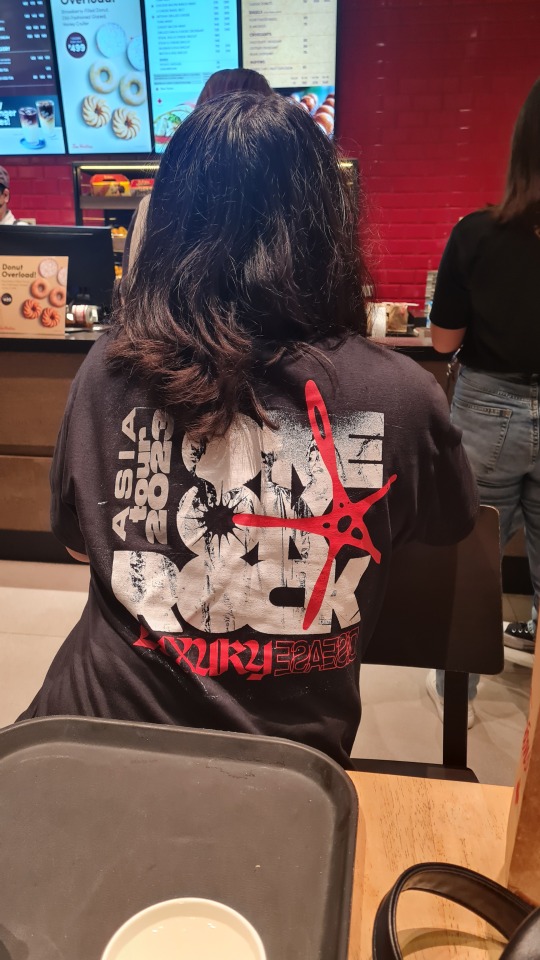



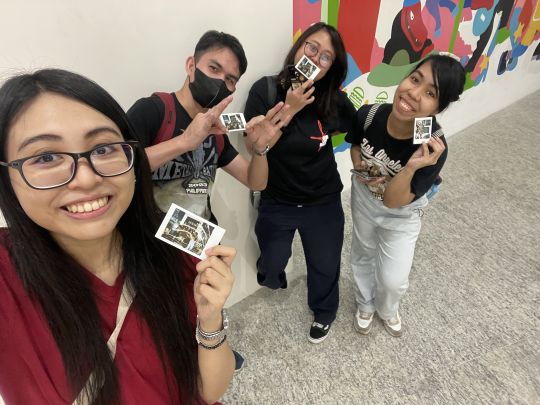







September 26, 2023 - #ONEOKROCKinMNL2023
Last month, I attended my first J-rock concert, and, not to mention, it was my first time going to a concert alone. Initially, my partner and I were supposed to attend their "Eye of the Storm" concert in 2021, but the pandemic happened, and I had to refund the concert tickets because no one knew what would happen at that time. Everything was completely uncertain back then.
Fast forward to today, Pulp announced that they were bringing the "Luxury Disease" Asia tour to Manila. I asked Asis if he wanted to attend, and he said no due to unforeseen circumstances. I didn't wait in the queue when the tickets went on sale. They were sold out after a few hours.
Later, I read that they were going to open more seats. Since I still wanted to experience watching them live, I decided to go alone. I waited for the second batch to open and was contemplating getting a General Admission ticket. However, I ended up with an Upperbox seat. The area I got was on the furthest right, Toru's side. I had no problem with that because Smart Araneta Coliseum is just the perfect size. I could still see them on stage compared to MOA Arena or the Philippine Arena.
I was excited when the day came. I was even active in group chats. I also bought official merchandise t-shirts for myself and Asis. Thankfully, I was able to secure a slot since the t-shirt design we wanted was instantly sold out. Anyway, I was planning on making new friends. I said to myself that I would be Miss Congeniality that day. However, being the introverted person that I am, I made zero OOR friends.
The concert was amazing. They totally rocked! Taka's voice was just beautiful. What you hear on the tracks is pretty much the same live, or even better. They sang a total of 18 songs, including the repeated song "Neon." The first time they sang it, Taka had an in-ear monitors problem.
I was also hoping they would sing "We Are," which is one of my favorite songs of theirs. Instead, they performed their 2010 song "Kanzen Kankaku Dreamer." This was fine with me since I had read on Facebook group pages that Filipino fans were hoping they would perform this song.
So, the concert ended with all of us in high spirits and still wanting more. Just as I was about to exit the arena, I made three friends. They were long-time fans of One Ok Rock, while I'm a relatively new fan. I discovered them in 2018 and became an instant fan after watching their live performance videos.
All in all, it was quite an experience. I can't wait to see them perform live again, hopefully with Asis next time. I'm also looking forward to their next release.
P.S. I asked someone to sign my name on the fan signing banner because I had to work that day, and I might not have been able to make it if I had waited until after my shift to sign it. Also, I'm grateful to my sister for accompanying me to dinner before I entered the dome.
--
I brought my Instax Mini with me and used up 4 or 5 shots inside the dome. Unfortunately, the shots either turned out blurry or too dark. I expected this, but I was still hoping they would turn out fine. What a bummer.
10 notes
·
View notes